Lona Manning's Blog, page 9
October 31, 2023
CMP#159 Isabel & Elizabeth, the dutiful heroines
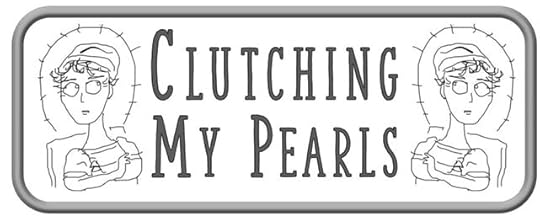 This blog explores social attitudes in Jane Austen's time, discusses her novels, reviews forgotten 18th century novels, and throws
some occasional shade
at the modern academy. The introductory post is here. My "six simple questions for academics" post is here. CMP#159 More reviews for forgotten books
This blog explores social attitudes in Jane Austen's time, discusses her novels, reviews forgotten 18th century novels, and throws
some occasional shade
at the modern academy. The introductory post is here. My "six simple questions for academics" post is here. CMP#159 More reviews for forgotten books
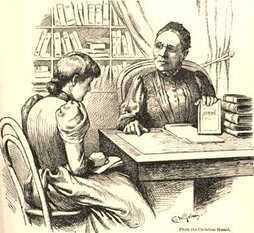 Morally improving The
previous forgotten book I reviewed,
The Metropolis, dwelt on the seamier side of London life; the fleshpots of Covent Garden and the propensity of wealthy people to destroy their lives over a game of cards. The next novel I picked up, alas, instantly delved into the same theme, but there is a big difference between the two titles which is worth noting in light of the debates which were raging at that time over the
morality and propriety
of reading novels.
Morally improving The
previous forgotten book I reviewed,
The Metropolis, dwelt on the seamier side of London life; the fleshpots of Covent Garden and the propensity of wealthy people to destroy their lives over a game of cards. The next novel I picked up, alas, instantly delved into the same theme, but there is a big difference between the two titles which is worth noting in light of the debates which were raging at that time over the
morality and propriety
of reading novels.The Metropolis received no reviews but if it had, I think the reviewers would have called it a book--to use their phrase--that you could not safely put into the hands of your daughter or sister. It is too detailed in its depiction of vice, and the vices and crimes committed in the book (fornication, gambling, cheating at gambling, highway robbery) are not sufficiently condemned or punished. The Decision (1811), while going over much of the same ground, and in fact including a main character who commits criminal acts, would be safe for a girl to read because it is overtly religious and didactic. A reviewer said: “We trace in these volumes a laudable endeavour to convey as much moral instruction as could be admitted into a work of fancy.” Yes, The Decision is stuffed like a plum pudding with the wholesome raisins of morality. The title refers to the heroine's decision to put her father's wishes ahead of her own, and later, to turn down a fortune in exchange for marriage.
The Decision begins with a long and confessional letter from Charles Arundel to his old friend Mr. Beverly. Arundel married for love but becomes a gambler and a philanderer. At his dying uncle’s bedside, he sees that he’s been cut out of the will, which would lead to his ruin. He destroys the will and even poisons the uncle. He lives with his guilt until later on in life, after he is widowed, he decides to go to the West Indies and meet the young relative whose father was unknowingly cut out of the will.
The mention of the West Indies will bring thoughts of slavery to mind for the attentive modern reader, but there is no mention of slavery or colonial exploitation as a sin or even as a cause of remorse in this book--a book which features many people who do things that they regret, such as marrying for ambition. Once again the West Indies are a plot device to remove the father from the action, so the heroine can live with the Beverly family. Guilty secrets
When Charles Arundel goes to the West Indies to atone for the crimes of his younger days. He leaves his daughter Isabel with Mr. Beverly and his family. Isabel is lovely and intelligent, a fact that doesn’t escape the notice of Mr. Beverly’s son Valcourt, but he is already engaged to a society belle. Rounding out the characters, we have some sisters and the mother, Mrs. Beverly, who makes life miserable for her husband with her extravagance and socializing. She believes she's entitled to do as she likes because she brought a fortune to the marriage, but she runs the family into debt. A reminder that the often-repeated notion that “women couldn’t inherit” back then is incorrect, and that wives could bankrupt and ruin their families just as husbands or irresponsible sons could. We’re told she ruins several tradesmen’s families when she doesn’t pay her bills. The Beverly women, and Valcourt's vain and shallow fiancée are contrasted with the virtuous and principled Isabel. We learn all about the faults of Mrs. Beverly--a cold wife, a partial and ill-judging mother--through the gossipy and unflattering things Isabel writes in her letters to her father about her host family. Mrs. Beverly's sins are first punished by the death of her youngest son, whom she both over-indulged and neglected. Mr. Arundel arranges matters so that Isabel pays the price for his wrongdoings. Stir in a few more rivals for Isabel's hand, and add a series of impediments keeping the hero and heroine apart. For once I’m not going to give all the plot spoilers; suffice it to say I thought it was good melodramatic fun and there was only one amazing coincidence. Being virtuous does not spare the main characters from suffering and hardship, but misbehaviour brings others sorrowing to their graves. It’s a lively soap opera interspersed with moral lessons. Silly and old-fashioned? Sure, but don't the phony videos posted on social media, showing people who behave badly getting their comeuppance, show that people are just as drawn to morality plays today?
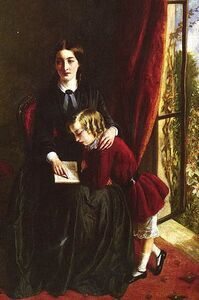 Willoughby (1823)
Willoughby (1823)The same anonymous author also wrote Willoughby, or Reformation, the influence of religious principles (1823), The Acceptance (1810), and Caroline Ormsby or the real Lucilla, interspered with sketches moral and religious (1811). “Lucilla” is a reference to the heroine of Hannah More’s staggeringly popular novel, Coelebs in Search of a Wife, which spawned a host of imitators. I just peeked into Caroline Ormsby, but I read Willoughby to see how this Willoughby compared with Austen's character. Willoughby Coventry is the only son of a respectable family. From the outset of the novel, Willoughby is a dissolute, gambler and a selfish coward. The subtitle promises us that Willoughby will redeem himself, but why I should care whether he redeems himself or not, I don’t know.
The Coventry family--and the father--are finished off with more financial blows; a shipwreck in which they lose some property, and a bank failure. Willoughby responds with nervous collapse and is no help in supporting his mother and sister. He somehow manages to win the affections of a silly young heiress, because he is “fascinating” and “handsome.” The author wasn't able to show the fascinating side of this character, though, we are just told he's fascinating. The young bride exults, Lydia-like, in having her way: “When I look at the ring on my finger, and think I am married, it is so droll, I quite laugh at the idea.” Alas, the marriage soon goes sideways, and Willoughby continues to be a waste of space. He finally pulls himself together after a near-death experience in the third volume, and after his wife’s death, he finds happiness with a worthy woman.
Willoughby’s virtuous sister Elizabeth, on the other hand, doesn't hesitate to take a job as a governess to help support her mother and announces that it is no degradation to do so.
Our anonymous author specializes in virtuous females who are brought into desperate straits by the bad decisions of their male relatives, but these heroines are always resigned and saintly and display unconditional love for their wretched fathers. In The Decision, Isabel resolves to obey her dying father's injunction to marry her cousin Horatio, even though she's in love with Valcourt Beverly and he with her: “watching the altered looks and languid breath of her father, she almost gloried in the sacrifice of her own happiness, could it ensure to him the blessing of peace in these last eventful hours.”
In Willoughby, an off-stage character named Matilda consents to marry a rich man she doesn’t love to pay off her father’s gambling debts. Her husband dies, her father dies, and she dies of grief, so it’s hard to see what she gained by her sacrifice. But the author praises her up as a saint. This is evidently female behavior to emulate. Elizabeth at least ends up happily married with a convenient fortune. Deservedly forgotten?
This author espouses beliefs and a worldview which might appeal to some traditionally-minded readers, but I'm coming to feel that the moral codes promoted in these sentimental novels will prevent a revival of this and other forgotten authors. My own interest arises out of looking at what these novels say about the preoccupations of the society they were written for, what publishers offered to readers, what critics praised or condemned, and how it compares to Austen.
Austen handles the same topics and Christian beliefs but she's quite subtle and indirect: you can catch the faintest allusion to redemption and salvation in Mansfield Park, her most didactic novel, when Fanny Price is worried that her cousin Tom Bertram’s illness might be fatal. “Without any particular affection for her eldest cousin, her tenderness of heart made her feel that she could not spare him, and the purity of her principles added yet a keener solicitude, when she considered how little useful, how little self-denying his life had (apparently) been.” That “keener solicitude” might sail right past a reader not familiar with Christian doctrines.
Jane Austen also kept the sordid stuff off stage in her novels. Willoughby’s seduction of Eliza, Maria Bertram Rushworth’s adultery with Henry Crawford, and Lydia living in sin with Wickham--they are all discussed at second-hand, not directly narrated. We never enter a bordello or a gaming hell with Austen.
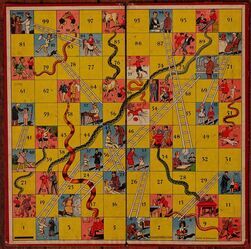 Snakes and Ladders
Snakes and LaddersAfter reading a lot of these novels, it really strikes me how often authors resort to beggaring a family through gambling debts or bank failures, or enriching a family through unexpected bequests of East and West Indian fortunes. It’s like a Regency game of snakes and ladders with heroes and heroines either tumbling down into financial ruin or suddenly climbing up to fabulous wealth, as their authors roll the dice and move them around the board. The Decision features a long-lost relative (actually in this case, an old friend) returning from the East Indies with a fortune to bestow on the heroine in time for her marriage. This is an exceedingly common plot device of the time. In Willoughby, one of Elizabeth's suitors comes into a fortune (one of those convenient uncles) and she is able to marry and give a home to her mother.
Austen found a different way to impoverish the Dashwood girls in Sense and Sensibility, but a small West Indian fortune comes to the rescue for Mrs. Smith in the final page of Persuasion.
In all three of these novels--The Decision, Willoughby, and Mansfield Park--the fact of slavery and colonialism is present in the background, but not held up for examination or condemnation. No consequences flow from the fact that the wealth which props up these families comes from chattel slavery despite the fact that these novels grapple with the questions of correct moral conduct as a central theme. Other authors did condemn slavery, and it is interesting to see such a wide disparity of consciousness about slavery in the novels of this era. About the author
The works of this novelist have been misattributed to female authors such as Grace Kennedy, Barbara Hofland, and Jane West. But the reviewers of Caroline Ormsby speak of the author as a "he." The confusion seems to arise out of the fact that there were multiple novels titled Decision. Another possible clue is found in the second volume of Caroline Ormsby, which includes a letter from a mother to a daughter, advising her to avoid attempting to become a novelist, lest she neglect her domestic duties and make herself ridiculous. This, I suppose, makes it more likely that the author is a male, but I still suspect the writer is a female. However, I can't imagine any academic championing her as an author worth re-discovering.
We know nothing about the author of these books other than the fact that (s)he was conventionally religious. (S)he includes a minor character, a fanatical Methodist woman who despises all earthly enjoyments, in Willoughby. (S)he gives away nothing about herself in her prefaces, and merely repeats the moral lessons she intends to promote in the story. Her/his books were published by Henry Colburn. Previous post: Brian, the lucky hero
Published on October 31, 2023 00:00
October 26, 2023
CMP#158 Brian, the lucky hero
 This blog explores social attitudes in Jane Austen's time, discusses her novels, reviews forgotten 18th century novels, and throws
some occasional shade
at the modern academy. The introductory post is here. My "six simple questions for academics" post is here. CMP#158 A first review of The Metropolis, or, a Cure for Gaming: Interspersed with Anecdotes of Living Characters in High Life (1811), by Cervantes Hogg (pseud)
This blog explores social attitudes in Jane Austen's time, discusses her novels, reviews forgotten 18th century novels, and throws
some occasional shade
at the modern academy. The introductory post is here. My "six simple questions for academics" post is here. CMP#158 A first review of The Metropolis, or, a Cure for Gaming: Interspersed with Anecdotes of Living Characters in High Life (1811), by Cervantes Hogg (pseud)
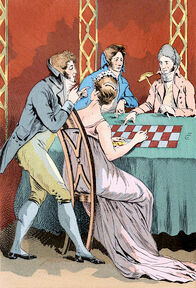 This is the first review that The Metropolis, a novel published two hundred and twelve years ago, has received, but it’s just as well the author didn’t hang around for my verdict. I don’t think I can be objective because so much of the story is taken up with scenes of gaming (card playing, dice, and horse-racing). I have trouble mustering interest, let alone sympathy, for people who stay up until four in the morning, playing at cards until they destroy themselves.
This is the first review that The Metropolis, a novel published two hundred and twelve years ago, has received, but it’s just as well the author didn’t hang around for my verdict. I don’t think I can be objective because so much of the story is taken up with scenes of gaming (card playing, dice, and horse-racing). I have trouble mustering interest, let alone sympathy, for people who stay up until four in the morning, playing at cards until they destroy themselves. The title tells you that London is the real subject of the novel; that is, the vortex of dissipation that is Regency London. "Anecdotes of living characters in high life" tells us the story portrays the upper classes behaving badly, so the readers from the growing middle classes could tut-tut over baronets who were boobies, and silly knights who were selfish gourmands, and duchesses who gambled their fortunes away. Even the Prince of Wales (that is, George just before he became Prince Regent), makes an appearance and is upbraided for his faults.
So this is one of those novels that purports to combat vice by describing vice. Since gambling strikes me as being, as one wag put it, a tax on the mathematically incompetent, I am not titillated by descriptions of it. I'm just alternately bored and disgusted.
The author also commits poetry--he includes a long and tragic poem about a young man who ruins others and ruins himself by gaming. The poem provides the strong moral lesson which is missing from the main storyline; serious moral lessons were essential to getting a good review in those days. With so many people opposing novel-reading, defenders of the novel countered that that a well -told story could effectively convey a moral lesson.
But Metropolis's plot provides, at best, a morally ambiguous tale.
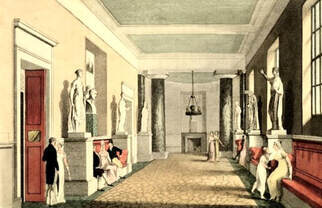 Accosting girls in the hallways and lobbies of the theatres A Lucky Break
Accosting girls in the hallways and lobbies of the theatres A Lucky BreakBrian Bonnycastle is the son of an impoverished vicar with a large family. “A rich merchant, a Mr. Hewson, of St. MaryAxe, London, an old acquaintance of the vicar, had offered to ease him of part of his heavy family, by taking Brian, the eldest son, into his counting-house, which offer of disinterested friendship Mr. Bonnycastle had joyfully accepted.” Mr. Hewson is portrayed as intelligent, upright, kind, and humane, unlike so many portraits of vulgar merchants of the time. Brian lives with the family and naturally, he falls in love with the beautiful Charlotte Hewson, and she with him. He feels his love is hopeless, given that she’s a wealthy heiress and he’s a clerk, but he is startled into confessing his love for her after coming to her defense at the opera.
Almost any time the heroine of a sentimental novel goes to the opera or theatre, something unpleasant happens, usually involving some boorish and drunken “gentleman” who takes liberties with her. In this case, the boorish gentlemen somehow know that Charlotte is a merchant’s daughter and one of them insults her thus: “As she turned away to avoid their impertinent gaze, one of them raised the edge of her hat,” praises her beauty, and asks her to become his mistress: “Will you be my chere amie, and exchange a shop for elegant apartments?”
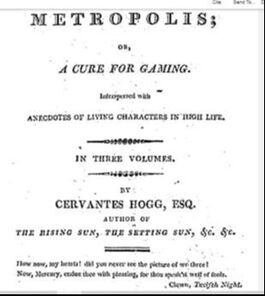 The Rise and Fall of Brian
The Rise and Fall of BrianBrian punches the cad in the face, whereupon our hero is challenged to a duel, which he accepts. An army captain, overhearing the confrontation, offers himself as Brian’s second. Both combatants are wounded. Luckily for the naïve Brian, his new friend Captain Fascine finds him an excellent surgeon to remove the bullet and heal the wound. Fascine will become the secondary hero and fall in love with Charlotte’s best friend, the saucy Miss Thrum.
The uproar over the duel means that Brian’s love for Charlotte, and her love for him, are out in the open and (to my surprise) the wealth disparity is not an impediment. Mr. Hewson blesses the engagement, in recognition of Brian's many virtues and his great promise. So what does Brian do? He immediately throws it all away, through the bad influence of Charlotte’s brother, who has returned from the Grand Tour. He takes Brian along to his favorite London brothels and gaming dens. From this point in the novel, we spend a lot of time in Covent Garden and other spots. The narrative is never explicit or graphic, but we learn that our hero sleeps with prostitutes and acquires a mistress, named Mrs. Fisher.
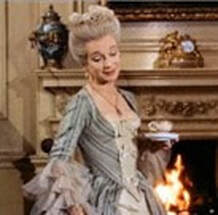 Joan Greenwood as Lady Bellaston in the 1963 Tom Jones movie Third-rate Fielding?
Joan Greenwood as Lady Bellaston in the 1963 Tom Jones movie Third-rate Fielding?As the story progresses, more characters are introduced; a duchess who is a gambling addict, a girl sold into a loveless marriage, a baronet’s widow who is an Amazon, a gluttonous knight, and a clever servant who speaks with a strong West Country accent: (Wull ye take me up or no, Zur? I hopes I ben’t rude, but I don’t like to hear my mare run down").
Brian is rescued from his downward course when he’s taken up by a reformed gambler named Verjuice. Well, reformed in a very particular sense. Verjuice opens Brian’s eyes to the fact that he’s being fleeced by his Covent Garden friends. He teaches Brian how to out-sharp the sharpers; and instead of losing money, he and Verjuice start building up a handsome stake.
Brian wants to win Charlotte back but he knows he'll never be allowed to marry her so long as he is nothing more than a professional gambler. He proposes that he should “bestow my money [i.e. bribe] any person possessed of sufficient interest to procure me a genteel post under Government.” Although nothing comes of this, his mistress Mrs. Fisher uses her “interest” to get a promotion for Brian’s friend Captain Fascine. This is all related in a matter-of-fact way because this is how you get ahead in Regency England. No-one condemns it. I think Austen, likewise, treats the question of interest and promotion as a fact of life in Mansfield Park, though some have claimed to find hidden hints that she criticized the status quo. We might note that Jane’s father applied to anyone of influence in his personal network to help advance the naval careers of his sons and the family rejoiced whenever they did advance. A fact of life.
Nothing come of that scheme. Brian continues to gamble and he becomes entangled with a duchess behind Charlotte's back. Is this an attempt at creating a Tom Jones-like scenario? He is also shown as a kind-hearted person who performs acts of generosity and heroism. Rewards, in the form of useful coincidences, arise from Brian's actions. He helps a poor widow and the lodger at her house turns out to be a helpful ally. And no prize for guessing that the two young ladies Brian rescues from a runaway carriage are Charlotte and her friend Miss Thrum. Through various clumsy plot contrivances, Brian gains back the good will of the Hewsons and his own father, while he accumulates enough money through gambling to launch a respectable career as a banker.
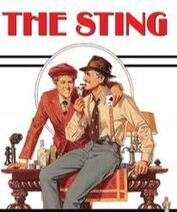 Con man as hero Moral ambiguity
Con man as hero Moral ambiguitySo Brian is redeemed without having to go through much suffering. Any redeeming features to this novel? Academics might find it interesting as an example of a novel where the main characters (Brian and especially Verjuice) are of humble birth, and the merchant class is treated with respect while the high-born are mostly foolish or venal and where the parents of the two loving couples let their daughters marry for love. Charlotte's brother, who reforms himself and apologizes for drawing Brian “into the vortex of his dissipation,” comes back to England with a Spanish heiress. The fact that she is Roman Catholic is not an issue. Therefore you could argue that this novel champions social equality, companionate marriage, and an end to religious bigotry. However, I don't think we can credit Barrett with trying to inject liberalism into the sentimental novel. I think his aim was to write a whimsical, picaresque tale with more realistic moral ambiguity than one finds in most English novels of the period.
I always take note of any references to slavery and there are none in this novel. Two West Indians are mentioned only in connection "with the idea of rum, sugar, indigo, cotton, [which in turn] begets that of wealth, [therefore] the new comers instantly attracted the side-glances of the [other gamesters].” They turn out to be not West Indians at all but disguised professional sharpers.
If you are interested in Regency slang, this novel abounds with it. Mrs. Fisher suggests that Brian “take a ride,” meaning, that he turn highwayman. “Have you not been a gamester? And that, I am sure, is the worst calling of the two.” She also dismissively calls her former lover, the one she rejected for Brian, a “scrub.” She don’t want no scrubs. Mrs. Fisher is not punished by the author for being a fallen woman. She does not die of remorse. In fact she moves up in the world, becoming the mistress of H___ R______ H______. Some attention is paid to the Napoleonic wars and the disruption it caused to merchants.
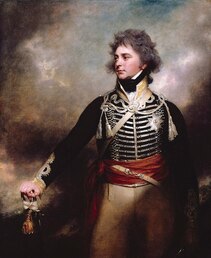 George, Prince of Wales and Prince Regent, aka H____ R______ H______ About the author
George, Prince of Wales and Prince Regent, aka H____ R______ H______ About the author"Cervantes Hogg" is the pseudonym of Eaton Stannard Barrett (1786–1820), an Irishman whose writing career focused on political satire in prose and verse. Though Metropolis didn't draw any notice, some of his other publications did. The Rising Sun (1808) drew a scathing review from The Satirist, or Monthly Meteor: “This wholesale dealer in scandalous anecdotes… presents himself to the world as a Satirist, armed in the cause of virtue, and ready to combat the monster vice, in all its horrid forms. If to display vice, in her most disgusting undress, be to serve the cause of virtue, he might indeed boast of being her champion…[b]ut indeed, to enumerate all the gross depravity which fills up the first volume, would be to make ourselves accomplices in this outrage against decency.” An old book catalogue describes The Rising Sun as "A severe satire on George IV, when Prince of Wales, and most of the leading characters of the period.” The Royal Collection Trust has a copy, perhaps thumbed by George himself. Novels like Metropolis which excoriated the upper classes and even included satirical portraits of real people were a popular sub-genre, after the runaway success of the novel A Winter in London (1806).
Barrett had one best-seller: The Heroine, or: Adventures of a Fair Romance Reader (1813), based on the trope of girls thinking that novels are just like real life. See also Charlotte Lennox's The Female Quixote (1752). Jane Austen loved both of these books and Northanger Abbey is her entry into this sub-genre.
Wikipedia states, "little is known of Barrett's life. He appears to have died of tuberculosis in 1820, and yet he is mentioned as an author in a publication called The American Farmer, printed in Baltimore and dated 1823. Given his reported financial difficulties, it is possible, though unproven, that he fled to America to escape his debtors. His death was recorded in The Ladies' Monthly Museum, as having taken place in Glamorgan."
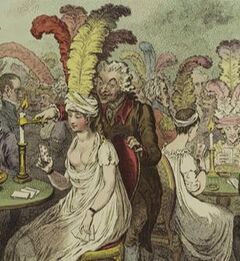 Hogg/Barrett explicitly editorializes against gambling for women: “The disgusting influence of this sordid vice is so pernicious to female minds, that they lose their fairest distinctions and privileges, together with the blushing honours of modesty and delicacy: a female mind deprived of these jewels, is one of the most desolate scenes in the world; and the ruinous consequences of gaming have already materially affected the character and deportment of the gentler sex; already the finest qualities of womanhood are perishing under its blast…”
Hogg/Barrett explicitly editorializes against gambling for women: “The disgusting influence of this sordid vice is so pernicious to female minds, that they lose their fairest distinctions and privileges, together with the blushing honours of modesty and delicacy: a female mind deprived of these jewels, is one of the most desolate scenes in the world; and the ruinous consequences of gaming have already materially affected the character and deportment of the gentler sex; already the finest qualities of womanhood are perishing under its blast…”This is a question sometimes discussed in Austen circles: are we supposed to believe that Mr. Knightley, Mr. Darcy, and all the other heroes, are virgins? If they are not virgins, then their choice of sexual partners would be limited to willing women of their own station (adultery or perhaps a merry widow), servants and girls from the lower classes (abuse of power), prostitutes or kept mistresses.
Previous post: Charles, the priggish hero
Published on October 26, 2023 00:00
October 19, 2023
CMP#157 Charles, the Priggish Hero
 CMP#157 Secrets Made Public by James Norris Brewer, a first review for an 1808 novel This blog explores social attitudes in Jane Austen's time, discusses her novels, reviews forgotten 18th century novels, and throws
some occasional shade
at the modern academy. The introductory post is here. My "six simple questions for academics" post is here.
CMP#157 Secrets Made Public by James Norris Brewer, a first review for an 1808 novel This blog explores social attitudes in Jane Austen's time, discusses her novels, reviews forgotten 18th century novels, and throws
some occasional shade
at the modern academy. The introductory post is here. My "six simple questions for academics" post is here.
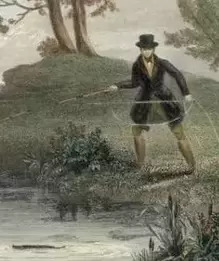 Author James Norris Brewer uses lecherous Methodists and radical freethinkers to liven up his tale of star-crossed lovers who get married in the third volume and have some more problems to sort out in the fourth volume in addition to uncovering the Big Secret that is quite obvious from the first volume. The narrator's voice is sardonic, while our hero and heroine indulge in the highest flights of exquisite sensibility. Consequently, the novel is an odd mix of overblown sentimental language, interspersed in a rather discordant way with the author’s animadversions on Mary Wollstonecraft, Methodists, social climbers and other bees in his bonnet, such as the drinking habits of Oxford scholars.
Author James Norris Brewer uses lecherous Methodists and radical freethinkers to liven up his tale of star-crossed lovers who get married in the third volume and have some more problems to sort out in the fourth volume in addition to uncovering the Big Secret that is quite obvious from the first volume. The narrator's voice is sardonic, while our hero and heroine indulge in the highest flights of exquisite sensibility. Consequently, the novel is an odd mix of overblown sentimental language, interspersed in a rather discordant way with the author’s animadversions on Mary Wollstonecraft, Methodists, social climbers and other bees in his bonnet, such as the drinking habits of Oxford scholars. The heroine, Ellen Fitzjohn, was left in the hands of strangers as a newborn. Her mother was a soldier’s wife who died giving birth while travelling with her husband's regiment; the distraught husband was forced to march away to embark for the East Indies. (This soldier, everybody notes, has the air of a gentleman and not a common private.) Baby Ellen fortunately catches the eye of the local baronet, a lonely widower. He adopts her and raises her as his own daughter.
Ellen grows up to be beautiful and virtuous. One day she goes to a nearby river to go fishing with an old family retainer; the bank gives way and she is swept off to certain death by drowning but luckily, a handsome youth who lives nearby leaps in and rescues her. With such an introduction, it is inevitable that Ellen and Charles Balfour fall in love...
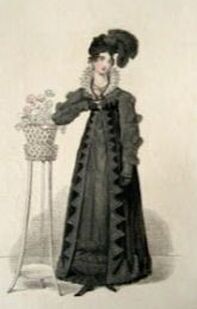 Troublemaking widow Cast of Characters
Troublemaking widow Cast of CharactersEllen is devoted to her old guardian, Sir Octavius Langdale, but it’s more of a challenge for Charles to display filial piety toward his own father. His eccentric, taciturn dad is the second son of a wealthy family. The oldest son married against his father’s wishes, then joined the army, and nobody is quite sure what happened to the errant couple after that, with suspicion falling on Charles’s father, who inherited the estate.
There’s some Northanger-like speculation here: surely, an English gentleman could not commit such a dastardly crime as to do away with his sister-in-law and her child, the true heir? Could he? “In this free and happy island, the Baron’s castle no longer contains dungeons, or harbours mystery and assassination. The actions of both high and low, however vindictive may be the temper of the one, or refractory that of the other, are performed, without reserve, in the open face of day. But, according to the tenor of his accusations, here stood a man of English birth, born to the customs of freedom and the openness of honour, who had stained the character of his country, by descending to worse than Neapolitan intrigue.”
But—if Mr. Balfour didn’t kill his sister-in-law and her baby after his older brother joined the army under a fake name and disappeared, then what became of them? It’s a real mystery.
Meanwhile, there’s a newcomer to Sir Octavius’s home. Mrs. Fortescue, the daughter of his late wife’s best friend, “not yet four-and-twenty,” who is received “with paternal kindness” after she is widowed. Mrs. Fortescue sets about trying to corrupt the ideals of young Ellen, because she--gasp—is a disciple of Mary Wollstonecraft, who comes in for quite a walloping in this novel.
(A reminder that after Mary Wollstonecraft died, her husband William Godwin published her biography, which caused a scandal with its frank disclosure of her personal life , including her illegitimate daughter, her suicide attempts, and her brief but intense obsession with a married man. At the time Secrets Made Public was published, Mary Wollstonecraft was persona non grata with respectable men and women.)
“O may the day at length arrive when woman shall attain her due rank in the social compact!” [Mrs. Fortescue exclaims to Ellen] “When the writings of her who boldly stepped forward the champion of her sex—the exalted author of the Rights of Woman—when those lines of eloquence and truth shall be copied in letters of gold!—I fear, my dear, that divine work, the Rights of Woman, has never been put into your hand.” Mrs. Fortescue also refers to the opinions of the Comte de Volney on prayer, a hint that she disbelieves the Christian religion, and like Mary Wollstonecraft’s husband, she thinks the institution of marriage is a prison: “Can anything be more preposterous than the prescribing of human laws for the conduct of natural affections?... Can human laws dictate its progress to the sentiment of the heart? Is there not—now tell me candidly—something ridiculous in the modes of courtship and of union observed between the sexes? –The lady must not feel a passion before the gentleman avows his; and having once received his addresses, she must like him better than every other man in the world; while, to complete the catalogue of contradictions, the natural affection of the couple must not… attain the summit of its climax, till certain forms have told it that it may proceed!”
Luckily for her virtue, Ellen disregards this dangerous nonsense.
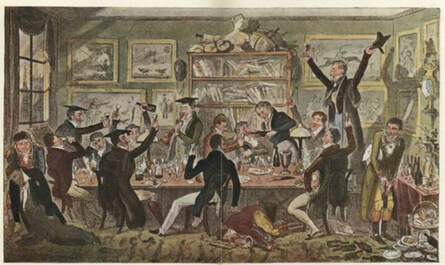 Charles is disillusioned when he goes to Oxford ' To round out the characters, we must mention the son of Sir Octavius. Robert Langdale is a wastrel and a ne’er do well, who cares only for horses, hounds, and the hunt. Yet Sir Octavius decides that Robert and Ellen should marry, and his generous bequest to Ellen is based on his assumption that she'll marry Robert. Ellen secretly loves Charles Balfour, but she tries to steel herself to obey her guardian’s injunction. “Forlorn and unfortunate that I am!” cried she, “how shall I tell my only friend, when he expects from me the obedience which he is entitled to exact—how shall I tell him that a passion has stolen into my breast, which would render obedience criminality? And a passion nurtured on unhallowed, chimerical grounds; yet which has power to sway my whole soul, and banish every other feeling, save those of honour.”
Charles is disillusioned when he goes to Oxford ' To round out the characters, we must mention the son of Sir Octavius. Robert Langdale is a wastrel and a ne’er do well, who cares only for horses, hounds, and the hunt. Yet Sir Octavius decides that Robert and Ellen should marry, and his generous bequest to Ellen is based on his assumption that she'll marry Robert. Ellen secretly loves Charles Balfour, but she tries to steel herself to obey her guardian’s injunction. “Forlorn and unfortunate that I am!” cried she, “how shall I tell my only friend, when he expects from me the obedience which he is entitled to exact—how shall I tell him that a passion has stolen into my breast, which would render obedience criminality? And a passion nurtured on unhallowed, chimerical grounds; yet which has power to sway my whole soul, and banish every other feeling, save those of honour.”Charles meanwhile has been packed off to Oxford, which he enters with great enthusiasm: “'Hail!' cried he, 'ye venerable abodes of all that can dignity the mind of man, of all that purifies nature and exalts intellect! –Great treasury of human wit! Sublime depository of lettered research, all hail! –Taste, science and art, combine to embellish your retreats, and sanctify each august cloister! Spirits of Newton, of Bacon, of Locke, of Johnson! Do ye not dwell, with paternal rapture, amid these hallowed domes? –Oh, bowers consecrated by the visions of the poetical, by the reflections of the philosophic, I recognize you with aspiring pride, and triumphantly profess myself one of the most emulous of your votaries!'”
Disappointment follows, as Charles discovers every gathering of scholars is devoted to drinking and making stupid puns and dirty jokes, and everybody thinks he's a nerd.
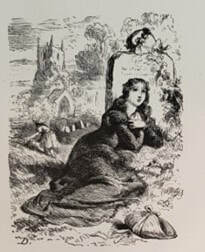 Best-seller: Children of the Abbey The tribulations of Ellen
Best-seller: Children of the Abbey The tribulations of EllenAfter Sir Octavius dies, the scheming Mrs. Fortescue abandons her advocacy of Free Love in favor of becoming a baronet’s wife, and she cajoles Robert to the altar. In losing her unwanted fiancé, Ellen loses the home she grew up in, and her bequest from Sir Octavius. She then, in the manner of sentimental heroines thrown on hard times, is forced to seek shelter in the homes of objectionable people—in this case, the guardians appointed by Sir Octavius’s will. They are vulgar merchants whose vast income comes from trade. But the titled people she meets are also objectionable. Ellen spends some unpleasant few weeks in London, fending off the advances of a stuttering Marquis who is described as a Methodist but he is a lying lecher.
By way of seduction, he asks her [The stuttering, of course, is for comic effect]: “'[D]i-di-di-did you ever read the Children of the Abbey?' 'No, my Lord!' replied she, averting her face, with unqualified disdain. 'The-the-then you have a great pleasure to come,' said he, 'de-depend on it.'" Later, the Marquis ambushes our heroine in the library and assaults her, raining down kisses on her virgin lips and bosom. His Methodist servant enters and blames her, accusing her of seducing his master “like Potiphar’s wife,” but her servant Betty comes to the rescue and sees the Marquis off before the worst occurs.
Luckily, Ellen meets up with her true love Charles, who must attend the courts in London at the behest of his father because of a mysterious overseas plaintiff who is bringing a court challenge against his claim to the family estate (Hmm, whatever did become of that missing older brother? Hmmm.) Charles’s father suddenly allows him to marry the dowerless Ellen, after keeping the lovers apart for years, and at the end of the third volume the couple live happily in the countryside in Wales. But this is not the end of our tale. The author says he is "entitled to the praise of novelty" for extending the story beyond the wedding. To set up for the fourth volume, Charles and Ellen are told they must move to the environs of London because of the ongoing court troubles. Here is Charles’s speech on the occasion: “My dear Ellen!... we must cultivate in our own bosoms the germ of genuine felicity which renders the pomp of courts, or the simple quiet of the cottage, the glittering splendours of the city, or the more precious charms of rocks, vales, and woods, like these--every extraneous circumstance—objects alike of secondary moment, or only transient importance.”
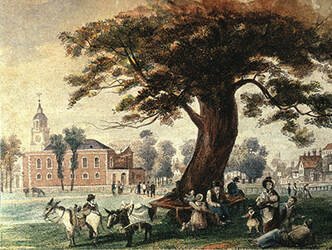 The village of C_____ Big Secret Reveal!
The village of C_____ Big Secret Reveal!The first part of the fourth volume is given over to a satirical portrayal of the vulgar citizens of the suburb of “C_____, a village of some notoriety in the modern maps of London and its environs.” The author evidently means to lampoon a real place and real people. It's interesting he comes down so hard, and at such length, on people from the mercantile classes because surely there are many novel-readers in their ranks: “Ellen soon found that the company of those persons who composed the major part of the village, was peculiarly disgusting to a mind blest with intelligence, and habituated to the society of the polished and urbane. The insolence of newly-acquired wealth among the low-born and illiterate, is too well known to need delineation; and Ellen, in this populous neighbourhood, saw it in all its various modifications…”
The lovebirds have each other, anyway, until the Methodists and Mrs. Fortescue (now Lady Langdale) team up to attack them. (Robert is busy drinking himself to death and Lady Langdale is carrying a torch for the dishy Charles.) They manage to fool Charles into thinking Ellen has been unfaithful and he treats her horribly. I thought he was a rather ridiculous windbag before, and he really lost me here: “O derogate soul of humanity! To what depths canst thou sink, when in so fair a form, in so bright a semblance of perfection, thou thus easily accomadatest thyself to the burthen of vice, to the loathsome trappings of hypocrisy!”
The misunderstanding is cleared up, Ellen is vindicated, she instantly forgives Charles--even though the shock of his cruelty almost killed her--and finally the big Secret is made Public. In fairness to the author, I will say he managed to fool me as to the real identity of an older man who shows up in the fourth volume to rescue Charles and Ellen’s child from a runaway horse. Surely, I thought, this is the long-lost father of Ellen? No, it wasn’t.
However, yes—the big Secret is that Ellen and Charles are cousins (but of course that’s not an issue). She’s the daughter of Charles's long-lost uncle, who now calls himself Colonel Vansittart, for some reason. He thought his child had died at birth. He's another example of how authors of this time sent characters to the East or West Indies to have them out of the way until they were needed for plot purposes. Looking at you, Sir Thomas.
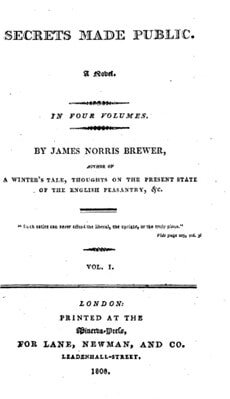 Abolitionist author
Abolitionist author Anti-slavery is certainly not a central theme of this novel, but James Norris Brewer (1777-1839) comes out swinging against it in a brief passage in the middle of his wrap up about who gets the Langdale estate: “five thousand acres, spread beneath the burning sun of the cane-islands, and fifteen hundred negroes, condemned to daily toil on the sanguinary plantations, shall be deposited, in the shape of a parchment title-deed, in the iron-chest of Willoughby Bronze, Esquire, and planter, of the island of Jamaica; and in the next, 'presto, begone!' the land, the negroes and every thing (except the title deed), shall be conveyed, by a single fall of the hammer, into the pocket of John Brown, stock-broker or army-agent, and esquire by courtesy of his accommodating country.”
Willoughby Bronze is not a character in the story, and appears to be a name representing all gentlemen plantation owners, who, objectionable as they are, are not as objectionable to James Brewer as upstart social climbers who acquire enough money to buy plantations.
Earlier in the story, Charles is sent by “the mandate of his father... to an estate in the western plantations, under the pretence of that part of the family property requiring the immediate inspection of a person interested in its successful regulation.” I presume this is a reference to a West Indian plantation. The author also says Charles would rather be poor than have his father's tainted West Indian money: “still he retained, in all its fervour, that glowing sentiment, which bade him prefer honourable penury to injustice coupled with the wealth of empires.” Which, after all, is more than Edmund Bertram ever says in Mansfield Park.
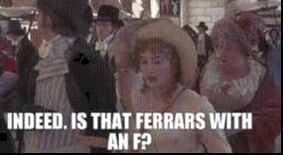 Brewer wrote at least eight novels and contributed to a number of travel guide books. His wife came from Clapham (Clapham, a village near London starting with C?). Perhaps Brewer was familiar with the abolitionists and social reformers known as the
Clapham Saints.
Brewer wrote at least eight novels and contributed to a number of travel guide books. His wife came from Clapham (Clapham, a village near London starting with C?). Perhaps Brewer was familiar with the abolitionists and social reformers known as the
Clapham Saints.
Secrets Made Public was not reviewed in its time. Someone offered an anonymous review to The Universal Magazine but the publishers refused, “upon the principle of never admitting any criticisms upon books without a knowledge of the writer” so we’ll never know if the anonymous reviewer was filled with praise or criticism for the work. We might note that Brewer was himself a contributor to The Universal Magazine.
Secrets Made Public might interest academics studying Mary Wollstonecraft's reputation in the decades following her death, and the way Methodists were portrayed in fiction in this time, and it is another entry in the list of novels which criticized slavery. The author's preface (which also appeared as an article in The Universal Magazine) gives advice on how to write a novel and defends novels as vehicles for moral instruction: “It would be difficult, I believe, to find one English Novel which does not endeavour to exhibit, in its catastrophe, the beauty of virtue and the deformity of vice.”
"Catastrophe" was used by some people the way we'd use "climax" or "denouement," which is kind of fun. I will say that Brewer attempts to tie his characters and episodes together and use his satiric characters in the plot, as opposed to being walk-ons for entertainment. He's trying to create a story in which all of the elements tie together, but blending a conventional sentimental novel with extended passages of social criticism made me wonder who the intended audience was. Previous post: Harriot the resourceful heroine For more examples of the critical way Methodists were portrayed in novels of this era, see my earlier blog series. Here are more examples of authors who spoke out against slavery.
The anti-novel attitudes of sentimental heroines, as famously discussed by Austen in Northanger Abbey, is a funny and recurring feature in novels of this era. James Brewer's heroine disdains to read The Children of the Abbey. Harriet Smith approvingly mentions The Children of the Abbey in Emma: [Robert Martin] “never read the Romance of the Forest, nor The Children of the Abbey. He had never heard of such books before I mentioned them, but he is determined to get them now as soon as ever he can.”
"The Children of the Abbey was one of the most enduringly popular Minerva novels; published in 1796, it had reached its tenth edition by 1825 and was still in print in 1882." (Howells, Coral Ann. Love, Mystery and Misery: Feeling in Gothic Fiction. Bloomsbury Publishing, 2014.) Brewer's plot does not rise to the Gothic heights of The Children of the Abbey. His villains are motivated by their faulty ideological beliefs, and Charles's father, while a very flawed individual, is not a murderer. Like Austen, he rejects the wilder, more fanciful conventions of the gothic.
People often talk about the parents in Austen (such as the flawed Mr. Bennet and the self absorbed Sir Walter Elliot) and how few fond mothers there are in her works. Some ask, what is it with Austen and parents? It seems to me that authors of this period simply killed off parents who weren't essential to the plot. Sometimes their death, as in the case of Ellen's mother, is the inciting event.
Here's the passage from Northanger Abbey in which Austen talks about the heroines of novels refusing to read novels. She's absolutely right, and it shows Austen's familiarity with the novel tropes of her day: Yes, novels; for I will not adopt that ungenerous and impolitic custom so common with novel-writers, of degrading by their contemptuous censure the very performances, to the number of which they are themselves adding—joining with their greatest enemies in bestowing the harshest epithets on such works, and scarcely ever permitting them to be read by their own heroine, who, if she accidentally take up a novel, is sure to turn over its insipid pages with disgust. Alas! If the heroine of one novel be not patronized by the heroine of another, from whom can she expect protection and regard?
Published on October 19, 2023 00:00
October 11, 2023
CMP#156 Harriot, the Resourceful Heroine
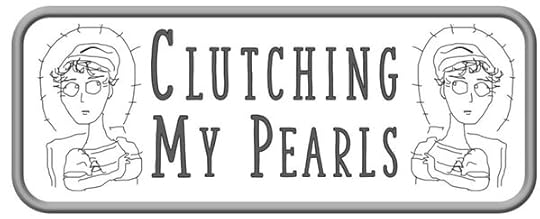 I read The Duped Guardian as part of my research into references to Lord Mansfield for my
backgrounder series
about Mansfield Park as a possible
allusion to Lord Mansfield
and the Somerset case. about how I explored the possible connection. This 1785 book contained a mention of "Mr. Mansfield," but I discovered it referred to a different lawyer named Mansfield, so I did not include this novel in my list of novels which mention Lord Mansfield. Here is my book review anyway. CMP#156 The Duped Guardian (1785), by Mrs. H. Cartwright, with bonus rabbit hole
I read The Duped Guardian as part of my research into references to Lord Mansfield for my
backgrounder series
about Mansfield Park as a possible
allusion to Lord Mansfield
and the Somerset case. about how I explored the possible connection. This 1785 book contained a mention of "Mr. Mansfield," but I discovered it referred to a different lawyer named Mansfield, so I did not include this novel in my list of novels which mention Lord Mansfield. Here is my book review anyway. CMP#156 The Duped Guardian (1785), by Mrs. H. Cartwright, with bonus rabbit hole
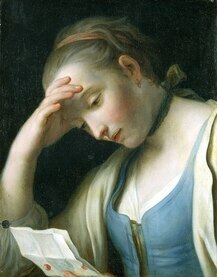 Shocking revelations for our heroine There are actually two duped guardians in this brisk two-volume tale. There are two heroines: both orphans, both heiresses, both controlled by guardians appointed by their late fathers’ wills. Both guardians want to keep the handsome inheritance and dispose of the girl quickly. There are two interlaced plots: one is all melodrama, the other is fairly comical (and in fact was "borrowed" from a comic play ).
Shocking revelations for our heroine There are actually two duped guardians in this brisk two-volume tale. There are two heroines: both orphans, both heiresses, both controlled by guardians appointed by their late fathers’ wills. Both guardians want to keep the handsome inheritance and dispose of the girl quickly. There are two interlaced plots: one is all melodrama, the other is fairly comical (and in fact was "borrowed" from a comic play ). Mrs. Cartwright orchestrates a story in which perils arise, and problems are resolved in a graceful and orderly fashion, like people dancing a minuet. Although there is drama, there is no great feeling of despair or tension, and this might be because the heroine, Harriot Pelham is intelligent and resourceful. She and her sidekick friend Lady Laura Antrim don't lose their heads or faint in a crisis, but rise to the occasion with female solidarity.There is a secondary heroine, Clara Aubry, a Harriet-Smith-like picture of ignorance, only fifteen years old, of whom one character says: “innocence, when it is accompanied by a naïve goodness of heart, has charms irresistible.” Given Clara's imbecility, Harriot needs an intelligent friend and confidante to write her letters to (since this is an epistolary novel), which is where Lady Laura comes in. She's the saucy sidekick of the story. They both look out for Clara.
Harriot‘s guardian is her brother-in-law, Mr. Hoyle, with whom she lives, along with her older sister Caroline. Let’s plunge into the action: Thanks to a carelessly dropped letter, Harriot discovers that Mr. Hoyle is conspiring with a female panderer to abduct her, take her to a secluded mansion, rape her, and then stick her in a convent when he’s tired of her. Then he'll take her inheritance. She is determined to avoid distressing Caroline by revealing that her husband is a monster, so when she’s caught weeping, she pretends that she’s been crying over the pages of a tragedy. This brings a gentle rebuke from Caroline about indulging in “fictitious misery,” a reference to the common trope that novel-reading was harmful.
After the initial horrible shock, Harriot pulls herself together...
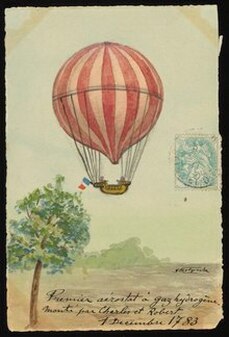 Laura refers to some current events, including the first hydrogen balloon flight. Spoilers follow
Laura refers to some current events, including the first hydrogen balloon flight. Spoilers followHarriot resolves to take her pin money and live in seclusion under an assumed name in the countryside until she comes of age and can control her own fortune. With admirable sang-froid, she sneaks away with her wardrobe, art supplies, and even her guitar, before anybody realizes she’s gone. This is certainly more prudent than the escapes conducted by some other heroines who flee with only the clothes on their back and hardly a sixpence to their name.
The farm couple are also, by coincidence, providing a home for the sweet and artless Clara. Clara has been left in the country to grow up ignorant not only of society, but also of basic literacy. Dr. Lovegold, her avaricious guardian, and Lord Wormeaten, the subtly-named lecherous old nobleman he plans to marry her to--think women are easier to control if they are ignorant. Harriot promptly sets about teaching Clara how to write and sketch. She also befriends a little neighborhood boy, the neglected son of an unlikable widow. Harriet stays in touch with her friend Laura by letter, filling her in on what's happening.
Dr. Lovegold shows up at the farmhouse and takes her back to his home in anticipation of her marriage to old Lord Wormeaten. On their trip home, a dashing young hero named Charles Luttrell spots Clara going by in her carriage and falls instantly in love with her. He pretends that he’s dying of consumption, so he can gain entrance to the doctor’s house and court Clara. End of Vol. 1. All Will Be Revealed
Since this is an epistolary novel, we get our information when one character writes an extremely detailed letter explaining what is going on to some other character. But these individual characters have limited knowledge of the whole picture, which Mrs. Cartwright tries to make the most of. Thus, Charles Luttrell decides that his friend Lady Laura would be the perfect person to shelter Clara until she’s old enough to get married, but he doesn’t realize that she lives with the lecherous Lord Wormeaten. While this limited knowledge adds to the suspense, it sometimes just ends up making everyone look extremely obtuse. (“You say you’ve met a beautiful young girl who's about to be forced into marriage with an ancient nobleman? What a coincidence! My guardian, an ancient nobleman, tells me he’s about to marry an innocent young girl.”)
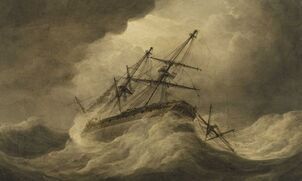 Just desserts for the bad guys What about Harriot?
Just desserts for the bad guys What about Harriot?Meanwhile, what of Harriot? When Harriot fled her sister’s house, she left a note letting her foul brother-in-law know that she was on to his diabolical scheme. He therefore has a strong motive to track her down and hush her up. By a lucky chance she learns that one of the unlikable widow is her brother-in-law’s accomplice. Harriot high-tails it out of the farmhouse before the two of them can snatch her. She seeks refuge in a convent in France.
The introduction of a convent into the narrative apparently obliges the authoress to drop in an extended editorial from Harriot on the superstitions and errors of the Catholic faith and the hypocrisy and avarice of Abbesses. I suspect it’s nothing personal, Mrs. Cartwright is just checking the boxes here. The real reason that the author has whisked Harriot across the Channel is because it provides a convenient way to kill off the evil brother-in-law and his accomplice. They pick up on her trail, hire a boat to follow her, and drown in a storm.
Harriot is now free to go back to her sister—who will never learn about her husband’s true nature. Meanwhile Clara has placed herself under the protection of Charles Luttrell, the man who loves her, who is—coincidentally—Lord Wormeaten’s nephew and his heir. Luckily, Lord Wormeaten is very good about the whole thing. The threat that he has posed through the whole book suddenly dissolves when he realizes he's been ridiculous to want to marry a child bride at his age. He urges Charles to marry Clara before he, Lord Wormeaten, dies so he can bless their union. Charles, by the way, did express his scruples about scooping up a fifteen-year-old heiress before she’s had a chance to look around her, but, satisfied that she loves him, and with the encouragement of his uncle, they marry.
Laura, the saucy sidekick, also marries the man of her choosing without any opposition, and all’s right with the world. Oh--wait a minute, what about Harriot? Although she has someone who loves her, Edwin Solmes, he’s not given a chance to do anything heroic, and Harriot, according to novelistic convention, is not allowed to confess her love for him. We don’t meet him until near the end of the book and we don't learn anything about him except that he's very pleased to see Harriot again. He "run'[s] on with such a rhapsody of thanksgivings” to the “Almighty Disposer of Events,” that Harriot jokes “it’s a doubt with me, Laura, whether the youth is not turned Methodist .”
Yes, as a novel, The Duped Guardian is deficient. Dramatic impediments are set up, and then waved away. But if Jane Austen wrote a story like this, the modern critical reaction would be to regard it as a protest novel--a feminist manifesto against the laws that kept females under subjugation to their parents and guardians and a bold argument for female education. The critics would extol the tale because it downplays the love stories in favor of showing our two female best friends capably handling a variety of crises. (For another novel of this type, though far more convoluted, try The Gypsy Countess ). Harriot even has the time and compassion to sponsor her late brother-in-law's illegitimate child, now orphaned because of the shipwreck. In addition to showing female agency in the face of patriarchal oppression, the novel features a minor subplot about a nobleman who marries a girl of humble birth for love alone.
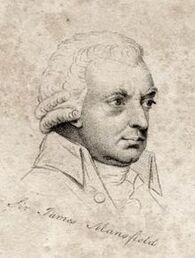 Sir James Mansfield. Not THAT Mansfield.
"Mr. Mansfield is to abdicate his reign"
Sir James Mansfield. Not THAT Mansfield.
"Mr. Mansfield is to abdicate his reign"
I only opened this book to check out the reference to a “Mr. Mansfield” which appears in Volume I, and I ended up reading the whole thing. It was breezy good fun.
Now, what does Laura mean by her passing reference to “Mr. Mansfield”? I'm sure it's a saucy reference because she's the saucy sidekick. She tells Harriot that Lord Wormeaten wants her out of the house before his new bride arrives “for fear I should endeavour to inculcate more fashionable propensions on her inexperienced mind, it is a determined point that I should never see her; to which end, he has very genteelly desired me to accommodate myself with some other friend till the arrival of that period, when Mr. Mansfield is to abdicate his reign, and my ladyship is in possession of the family Mansion.” [italics in original]
Mr. Mansfield is not a character in the book. It appears to be a reference to a real person whom the readers would know. But it's not Lord Mansfield, because Lord Mansfield was never “Mr. Mansfield.” His name was William Murray and Mansfield is the name of first, his baronial title, and then his earldom. Therefore, no one would refer to him as “Mr. Mansfield.”
I think Laura is referring to James Mansfield (1734 -1821), who was an eminent British jurist who served as a lawyer, a judge, as solicitor-general (at the time of this novel), and as an MP. His career overlapped that of Lord Mansfield.
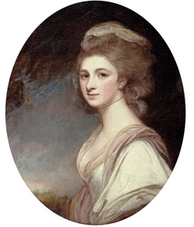 Frances Mary Harford by Romney Ripped from the headlines
Frances Mary Harford by Romney Ripped from the headlinesAnd I think I've discovered what the reference to abdicating his reign means. Laura is saying that when young Clara is brought to Lord Wormeaten's house, no-one will protect her from being pressured into marriage. Lady Laura is alluding to a recent sensational court case in which James Mansfield, as Solicitor-General, protected the rights of a young heiress named Frances Mary Harford, the illegitimate daughter of Lord Baltimore. Lord Baltimore had left Frances 30,000 pounds, which is the same amount that Clara Aubry has in the novel.
Robert Morris, a thirty-year-old barrister, and one of the executors of Lord Baltimore's will, took young Frances out of her boarding school by claiming to be her guardian and he fled with her to Europe when she was only twelve-and-a-half. “The tender years of Miss Harford, her innocence and unsuspicious temper, Mr. Morris took advantage of, by intoxicating her little head with notions of fine buckles, Ranelagh and masquerades." Moving from place to place, Morris arranged for two hasty wedding ceremonies. Once she came of age, and presumably regretted what happened, her foreign weddings were declared null and void because she had been underage and the weddings would not have been considered legal in the countries in which they were held. Frances was legally freed from Mr. Morris in May, 1784 and she remarried two months later and lived abroad with her second husband, a diplomat.
This provides an example that not all mentions of the name "Mansfield" have to do with Lord Mansfield or Somerset v. Stewart, even when law cases are involved.
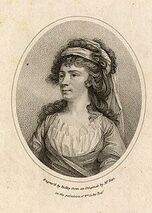 Elizabeth Younge Pope, who played the role of the saucy Miss Archer in "More Ways Than One." About the author:
Elizabeth Younge Pope, who played the role of the saucy Miss Archer in "More Ways Than One." About the author:Mrs. H. Cartwright (dates of birth and death unknown) wrote a book about female education, a hot topic at the time, as well as several novels and essays. The Orlando database of women writers says she is “otherwise unidentified." The Feminist Companion to Literature in English notes that Mary Wollstonecraft threw shade at Mrs. Cartwright's novel The Platonic Marriage in her own novel, Maria. Ernest Albert Baker, in his 1936 History of the English Novel, describes Mrs. Cartwright as “an indifferent specimen of the third rate” among novelists of her era. I will say in her defense that heroines showed pluck, so I put her amongst the proto-feminists. I mean, if we are going to praise Austen as a feminist because she has Anne Elliot observe to Captain Harville that women "live at home, quiet, confined," then surely this tale of two women who thwart the criminal behavior of some powerful men deserves a mention.
The Duped Guardian received two short and half-hearted reviews. The Monthly Review said: “the work is neither tedious nor insipid; it may afford amusement to please an idle mind, and instruction to warn a thoughtless one.” Note that nobody said, "But whoa, there's a bit too much anti-patriarchal stuff in here."
The Critical Review pointed out that Mrs. Cartwright borrowed her plot about Clara, “the artless niece of the artful physician,” from “Mrs. Cowley’s last comedy, viz. ‘More Ways Than One.’” That appears to be the case. In the 1783 play, a suitor pretends to be sick to win the heart of Arabella, the ward of Dr. Feelove, who is trying to get her married off while holding on to as much of her 30,000 pound fortune as he can. The play's Mr. Evergreen became the novel's Lord Wormeaten, and saucy sidekick Miss Archer became saucy sidekick Laura Antrim. It is interesting how freely people borrowed plots and ideas from one another in this era, when they weren't openly plagiarizing.
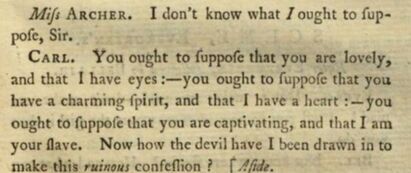 Ladies, get you a man who says he's your slave: More Ways Than One Mentions of slavery & colonialism
Ladies, get you a man who says he's your slave: More Ways Than One Mentions of slavery & colonialism The only mention of “slave” in The Duped Guardian is the typical declaration, made by the male lover, that he is the "slave" of his mistress, and the only mention of colonialism is when more than one character uses the phrase, not for the wealth of the Indies would I do such-and-such. No-one appears to have a colonial fortune.
Previous post: Mansfield and the cultural discourse *More on Sir James Mansfield Sir James Mansfield is connected to the Somerset v. Stewart case because he was one of the lawyers for the enslaved man Somerset! A 19th century biography tells us: “Though Sir James Mansfield was not engaged in many great trials, he was yet employed in two of the celebrated causes of his time; one involving a political principle and the other a great social evil.”
The Somerset case was not the “great social evil” or the “political principle.” The “political principle“ refers to an action brought by radical politician John Wilkes “for false imprisonment,” and the “great social evil” refers to bigamy. Mansfield defended the “Duchess of Kingston, when that singular lady was tried by the Peers for bigamy, in 1776.” The Somerset case was not even worth mentioning as one of the “celebrated causes of his time.”
The Somerset case dates from 1772, and though this landmark case might be well-known to every well-educated Janeite today, it doesn’t necessarily follow that in the years and decades following 1772, Somerset v. Stewart was the first thing that popped into people’s minds whenever the name “Mansfield” arose, as I've discussed in previous posts.
Sir James Mansfield also presided over the trial of John Bellingham, who was convicted for assassinating Prime Minister Spencer Percival in the House of Commons lobby on May 11, 1812. Bellingham, not surprisingly, was sentenced to death, even though questions were raised about his sanity. Bellingham appears as a character and the Percival assassination features in my second novel, A Marriage of Attachment.
For more about my books, click here.
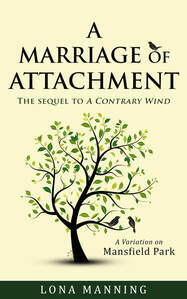 Robert Morris brought a court action attempting to force his (now grown) child-bride to be returned to him. James Mansfield, as Solicitor-General, put a stop to that.
Robert Morris brought a court action attempting to force his (now grown) child-bride to be returned to him. James Mansfield, as Solicitor-General, put a stop to that. 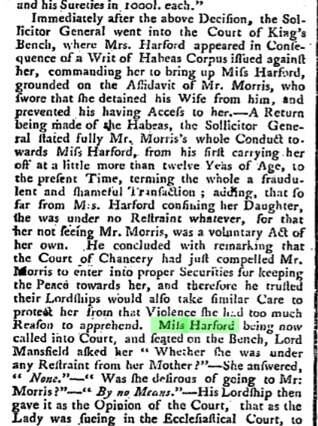
Published on October 11, 2023 04:34
October 5, 2023
CMP#155 Mansfield and the Cultural Discourse
 "I would suggest that [Austen] was quite deliberately gesturing at the cultural discourse that [Mansfield] represents, at his name’s indexical link to a particularly charged national moment... It is worth contemplating what Austen’s contemporaries would have understood that gesture to mean, given the reputational baggage of the name “Mansfield” in Regency zeitgeist and politics.
"I would suggest that [Austen] was quite deliberately gesturing at the cultural discourse that [Mansfield] represents, at his name’s indexical link to a particularly charged national moment... It is worth contemplating what Austen’s contemporaries would have understood that gesture to mean, given the reputational baggage of the name “Mansfield” in Regency zeitgeist and politics. -- Danielle Christmas, "Lord Mansfield and the Slave Ship Zong,"
Persuasions online Vol 1, number 2, 2021 CMP#155 Lord Mansfield and the Cultural Discourse
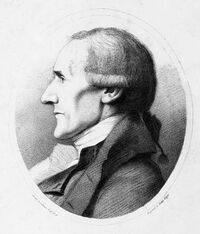 Granville Sharp helped the enslaved James Somerset bring his master to court I've been delving into digital archives to contemplate what "the reputational baggage of the name 'Mansfield'” in "Regency zeitgeist and politics," might have been. What was the "cultural discourse" around the name "Mansfield"? Yes, Lord Mansfield's rulings in Somerset and the Zong case might be a big part of our zeitgeist in Jane Austen circles in this age of racial reckoning, but as I have learned: the name "Mansfield" without any indication that it carried cultural baggage. It was just a
solid English name.
People referenced Lord Mansfield (1756–1788) in relation to many legal issues, including investments, insurance, libel, religious freedom, and so on, and made mention of his probity and patience. But it's not easy to find references to Somerset v. Stewart before 1840 in the popular literature. They probably exist, but I haven't found any. (I am not speaking of law books which are not read by a general public) So what would "Austen's contemporaries" have "understood that gesture" [of putting the name Mansfield in her title] to mean"? Based on my survey of digital archives. Lord Mansfield's rulings in the Zong case (1783) and the Somerset case (1772) were not a significant part of his posthumous reputation in the first half of the 19th century. Mansfield Park was first published in 1814.
Granville Sharp helped the enslaved James Somerset bring his master to court I've been delving into digital archives to contemplate what "the reputational baggage of the name 'Mansfield'” in "Regency zeitgeist and politics," might have been. What was the "cultural discourse" around the name "Mansfield"? Yes, Lord Mansfield's rulings in Somerset and the Zong case might be a big part of our zeitgeist in Jane Austen circles in this age of racial reckoning, but as I have learned: the name "Mansfield" without any indication that it carried cultural baggage. It was just a
solid English name.
People referenced Lord Mansfield (1756–1788) in relation to many legal issues, including investments, insurance, libel, religious freedom, and so on, and made mention of his probity and patience. But it's not easy to find references to Somerset v. Stewart before 1840 in the popular literature. They probably exist, but I haven't found any. (I am not speaking of law books which are not read by a general public) So what would "Austen's contemporaries" have "understood that gesture" [of putting the name Mansfield in her title] to mean"? Based on my survey of digital archives. Lord Mansfield's rulings in the Zong case (1783) and the Somerset case (1772) were not a significant part of his posthumous reputation in the first half of the 19th century. Mansfield Park was first published in 1814.
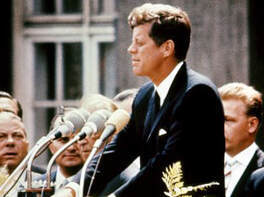 "Ich bin ein Berliner" What's your "Top of Mind" for John F. Kennedy?
"Ich bin ein Berliner" What's your "Top of Mind" for John F. Kennedy?Let’s take a more contemporary example: the reputational baggage of JFK. I’m old enough to remember when John Fitzgerald Kennedy was president. Though I was a young child, I remember the day of his assassination vividly. And I remember how people spoke of him and how his reputation gradually changed.
During the 60’s he was a secular saint. But what comes to mind now when someone mentions JKF? What is your top-of-mind association? That he was the first Catholic president? His inaugural speech ("Ask not what your country can do for you")? That brief shining moment known as Camelot? His glamorous wife Jackie? The Bay of Pigs? The Cuban Missile Crisis? The Vietnam War? His NASA pledge? His war record in WWII? His speech in Berlin? Little John-John saluting at his funeral? Or, do you think of his multiple extra-marital affairs? His sharing a mistress with a mob boss? The way his medical problems were kept a secret from the public? The Kennedy clan shenanigans in general? The evidence that his Pulitzer prize-winning book was ghostwritten?
if I saw a novel titled "Kennedy Park," I would expect the author to work in some reference to the allusion in the novel's denouement. I'd expect some kind of tie-in, not an allusion which is just left hanging there. I also would not expect that my top-of-mind recollection about Kennedy--or Mansfield--would be the same as everybody else's top of mind recollection. I will grant you that the fact of the Antigua plantation means there is a slavery connection which possibly connects to the title. But it's hard for me to believe that an author of her skill and polish would just leave the allusion hanging there.
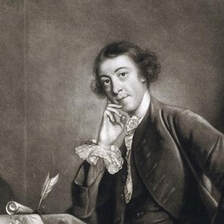 Horace Walpole (1717–1797) Lord Mansfield's reputation when alive
Horace Walpole (1717–1797) Lord Mansfield's reputation when alive When Lord Mansfield was alive and serving in Parliament, he was a target for the political opposition. We don't need to become experts in Lord Mansfield and his career to appreciate the fact that, in common with all politicians, his motives and integrity were questioned, and his policies and his court rulings were attacked. The English radical Thomas Paine was dismissive of him: “The talents of Lord Mansfield can be estimated at best no higher than those of a sophist.”
Horace Walpole, English man of letters, apparently loathed Lord Mansfield. Walpole’s language suggests a political animus, and without delving deeper into the whole thing, I provide this quote simply to give a sample as evidence that Mansfield was not universally revered: “The dismay and confusion of Lord Mansfield was obvious to the whole audience; nor did one peer interpose a syllable in his behalf; even the Court (whom he had been serving by wresting the law, and perverting it to the destruction of liberty, and his guilt in which practices was proclaimed by his dastard conscience) despised his pusillanimity and meanness…” and much more in the same vein.
An anonymous writer named Junius conducted blistering political attacks on Lord Mansfield, but these occurred before the Somerset case, so there is no reference to them.
Mansfield was a well-known national figure long before his rulings on the Zong case and the Somerset case drew publicity in the ongoing abolition debate, so therefore his name was associated with many political and legal issues. Lord Mansfield, like all politicians, was satirized and attacked in contemporary political cartoons. The British Museum explains this cartoon as follows: "Satire on Lord Mansfield and his judgements allegedly undermining British liberty. The thread of liberty is drawn from the heart of King John and spun by William III (Lachesis, measuring the thread) so as to bind scrolls representing 'Habeas Corpus', 'Free Elections', 'Magna Charta', 'Trial by Juries', 'Bill of Rights' 'Security of private Property', 'Killing no Murder and 'Appeals', the last three having been cut from the thread by Lord Mansfield ('[Judge] Jefferies in the Character of Atropos') who now holds his shears against the 'Bill of Rights'. From the Political Register, 1770."
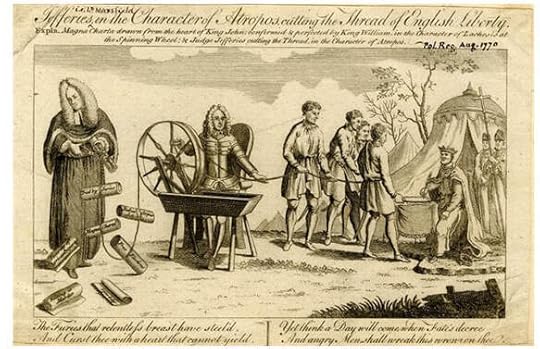 The Furies that relentless breast have steel’d, and curst thee with a heart that cannot yield
The Furies that relentless breast have steel’d, and curst thee with a heart that cannot yieldYet think a Day will come when Fate’s decree, and angry men shall wreak this wrong on thee. "Lord Mansfield is no lawyer"
Here is an 1781 editorial which opposes the Somerset case and calls Lord Mansfield a "republican" who "under the vile pretence of unalienable rights" has set a dangerous precedent which "deprives the master of his legal property."
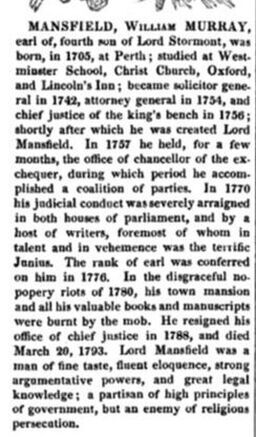 Brief 1831 biography doesn't mention Somerset. Today even a brief biography of Mansfield would. Posthumous Reputation
Brief 1831 biography doesn't mention Somerset. Today even a brief biography of Mansfield would. Posthumous Reputation The first full-length biography of Mansfield came out five years after his death and was written by John Holliday: The life of William late Earl of Mansfield, 1797. It runs to more than 500 pages, and it does not mention "slave," "slavery," or "Somerset" in the the text or the index, although many other of his cases are discussed. Neither is the now-infamous Zong c ase mentioned. This biography came out in subsequent editions and years as well.
In between 1797 and the 1830's, you can find mentions of the Somerset case in relation to the abolitionist who spearheaded the campaign to bring the case to court: Granville Sharp. Here is a typical example. which quotes a memoir of Sharp. Sharp wanted posterity to remember his role in the case. But "Sharp Park" doesn't have the same ring to it as "Mansfield Park." As well, it is mentioned in accounts of famous trials.
Other, briefer biographies of Lord Mansfield were included in encyclopedias and compendiums, with mentions of the Somerset case emerging in the 1840's:The Cabinet Cyclopaedia by Henry Roscoe, 1830, features a 57 page biography of Mansfield in an anthology of biographies. Roscoe mentions decisions which touch on religious liberty and civil rights, as well as libel and insurance, but no mention of Somerset v. Stewart.A Dictionary of Biography. Comprising the most eminent characters of all ages, nations, and professions ... Embellished with numerous portraits. Richard Alfred Davenport, ed. R. Griffin & Company: Glasgow, 1831 and reprinted in several editions. One quarter-page biography, no mention of Somerset.Lives of eminent and illustrious Englishmen, ed. by G. G. Cunningham. United Kingdom, 1836. 10 page biography of Lord Mansfield doesn’t mention Somerset.Lives of the Most Eminent British Judges, by Henry Roscoe, duplicate of the 1830 article above.Lives of Eminent English Judges of the Seventeenth and Eighteenth Centuries. By William Newland Welsby. T. & J. W. Johnson, 1846. 80 page biography in an anthology. Detailed review of his life and his cases. No mention of Dido, but mentions his nieces. This anthology does mention the Somerset case but in connection with an earlier judge, Sir John Holt, not in Mansfield's biography. “Great as are the respect and gratitude with which all right-minded Englishmen must regard the memory of the Lord Chief Justice Holt, both as a criminal judge and an interpreter of constitutional law, he has no less a title to the veneration of every philanthropist, as the first judge who declared the soil of Britain incapable of being profaned by slavery….” Speaking of Holt, “in a subsequent case in 1707” Lord Holt declared, “no man can have a property in another, but in special cases, as in a villein, or a captive taken in war; but there is no such thing as a slave by the law of England.” It was not, nevertheless, until the solemn decision of the same Court in Somerset’s case in 1772, that this became an unquestioned principle of law, and could be made the exulting theme of the most thoroughly English among our modern poets [Cowper].”Baron Campbell, John Campbell. The Lives of the Chief Justices of England: From the Norman Conquest Till the Death of Lord Mansfield. Discusses and praises the Somerset case. John Murray, 1849.Leslie Stephen’s definitive Dictionary of National Biography (1895-1900) does include the Somerset case in its biography of Lord Mansfield. But as we've seen, biographers earlier in the century did not regard the Somerset case as one of Mansfield's most prominent decisions.
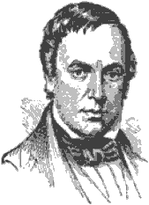 Alvan Stewart (1790-1849) After the Regency
Alvan Stewart (1790-1849) After the RegencyIn 1845, American lawyer and abolitionist Alvan Stewart praised Lord Mansfield for the Somerset decision and placed it in historical context: “But oh! What shall we say of the sublime humanity of Lord Mansfield and his compeers, who were not afraid to confess they had been wrong, and had the magnanimity to say it before a slaveholding age? This day saw the longest stride which British greatness ever took on the highway of human glory.
"Would to heaven that all courts might imitate the illustrious example in administering justice in the sublime humility, which dignified the court and exalted our kind, as in the case of Somerset! The great principles established in the Somerset case awakened the philanthropy of England, and put forth its strength in 1783, 1788, 1792, 1797, and finally, in 1806, was successful in the abolition of the African slave trade by Parliament. Wilberforce, Pitt, and Fox, were foiled again and again, in Parliament, the theatre of their eloquence, and seat of their power, but justice finally prevailed. This was the first great blow struck for the man of Africa, in three hundred years, from the beginning of his American and West Indian enslavement.
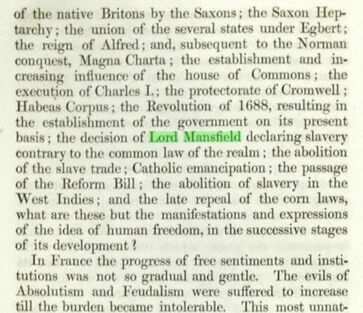 Lord Mansfield and the Somerset decision is included in a list of British events which were landmarks in the slow progression of human freedom and civil rights.
Lord Mansfield and the Somerset decision is included in a list of British events which were landmarks in the slow progression of human freedom and civil rights.The Development of the Idea of Human Freedom. A Lecture Before the North Brookfield Lyceum, Etc., by R.T. Robinson, 1848 Lord Mansfield's contribution to the emancipation of enslaved persons appears to have come to the forefront of the public mind only by the mid-19th century, after slavery was ended in the British Empire. A speech about Lord Mansfield made in 1865 describes Somerset as "perhaps his most celebrated decision." That certainly wasn't the case 50 years earlier.
In conclusion, I contend that when we replace speculation with research, the historical record indicates it is by no means a foregone conclusion that the title of "Mansfield Park" would have instantly signified Lord Mansfield and the Somerset case to Austen's first readers.I have found no mention by Austen scholars of the possible connection until the 1980's.Other authors used the name "Mansfield"without evidently referring to slavery.Authors who referenced Lord Mansfield did not refer to his Somerset ruling.Broader discussions of Lord Mansfield in literature did not reference his Somerset ruling.His first major posthumous biography does not mention the Somerset ruling.Praise for his Somerset ruling became more prominent in the 1840's and afterwards Previous post: Anti-slavery editorial
Published on October 05, 2023 00:00
September 26, 2023
CMP#154 Anti-Slavery Without Apricots
 This blog explores social attitudes in Jane Austen's time, discusses her novels, reviews forgotten 18th century novels, and throws
some occasional shade
at the modern academy. The introductory post is here. My "six simple questions for academics" post is here. I'm currently doing a series about the significance, if any, in "Mansfield" for her novel Mansfield Park. CMP#154 If we read Mansfield Park for its "brave" stance against slavery, (as opposed to its literary merits) why haven't we heard of Alethea Lewis and The Microcosm?
This blog explores social attitudes in Jane Austen's time, discusses her novels, reviews forgotten 18th century novels, and throws
some occasional shade
at the modern academy. The introductory post is here. My "six simple questions for academics" post is here. I'm currently doing a series about the significance, if any, in "Mansfield" for her novel Mansfield Park. CMP#154 If we read Mansfield Park for its "brave" stance against slavery, (as opposed to its literary merits) why haven't we heard of Alethea Lewis and The Microcosm?
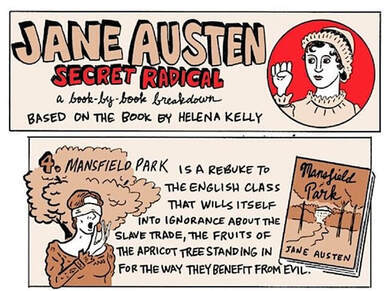 Graphic by Nathan Gelgud (detail) Mansfield Park is recommended to modern audiences because it grapples with the topic of slavery and how upper-class English families like the Bertrams benefitted from the revenue from sugar plantations. Sir Thomas, the patriarch of the story is sorting out his business affairs in Antigua during crucial events, but what he is doing there is only vaguely alluded to. The novel in fact does not make any pronouncements about slavery, nor are there any consequences for the Bertram family for living off the avails of slavery--though modern critics believe it contains veiled anti-slavery allusions.
Graphic by Nathan Gelgud (detail) Mansfield Park is recommended to modern audiences because it grapples with the topic of slavery and how upper-class English families like the Bertrams benefitted from the revenue from sugar plantations. Sir Thomas, the patriarch of the story is sorting out his business affairs in Antigua during crucial events, but what he is doing there is only vaguely alluded to. The novel in fact does not make any pronouncements about slavery, nor are there any consequences for the Bertram family for living off the avails of slavery--though modern critics believe it contains veiled anti-slavery allusions.Well, if anti-slavery messages are why we pick up Mansfield Park, we don't we toss it aside and read Alethea Lewis instead? Because she doesn't go with subtle veiled allusions. She doesn't hold back on her opinions of slave traders and plantation owners. We meet enslaved people in The Microcosm and we travel to Jamaica. Further, Lewis's novel was published before the slave trade (but not slavery) was outlawed, while Mansfield Park was published seven years after. Thus, Fanny Price asking her uncle a question about the slave trade, years after the trade was made illegal, is not exactly a daring thing to do. Regular readers of my blog will know this is something I've banged on about quite a lot, but I had to mention it again after discovering The Microcosm. The title presumably means, "this novel is a microcosm of society today."...
And, Lewis uses the name "Mansfield" in her novel! I personally don't think she is intending a reference to Lord Mansfield, but others may disagree.
If you've been told it was risky for Austen to speak out against slavery, and that she could only hint at it by speaking of "Moor Park Apricots," if you've been told she was brave for speaking out against slavery, check out what Lewis wrote, below (see "Editorial")
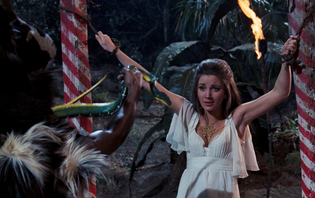 Jane Seymour in titillating Voodoo Peril, in James Bond movie "Live and Let Die" 1973 The Microcosm (1801) by Alethea Lewis
Jane Seymour in titillating Voodoo Peril, in James Bond movie "Live and Let Die" 1973 The Microcosm (1801) by Alethea LewisIn this elaborately plotted and didactic five volume novel, heroine Harriet Montagu is relentlessly pursued by Captain Millemont, a scoundrel with an extensive East Indian fortune. I don't know if "East" is an error on the author's part, because Millemont abducts Harriet and takes her to the West Indies, that is, to his plantation in Jamaica. She is in his power for months but he does not attempt any assault on her virtue, because he is pressuring her to marry him.
Harriet eventually escapes from Millemont's plantation and runs through the jungle. This part of the story slightly resembles Charlotte Smith's The Story of Henrietta (1800), but Lewis scoops her heroine out of danger right away, without the titillating perils faced by Henrietta when she is captured by a group of runaway slaves, if you get my drift. In both these novels, the threat to the heroine's virtue was the inducement to keep turning the pages.
Harriet is rescued by Mr. and Mrs. Cumberland, two kind strangers who luckily are passing by in their carriage. They take her home and give her shelter. “Mr. Cumberland, who was a wise and good man, further proposed that Miss Montague should assume the name of his maternal family, which was Mansfield, and pass for his relation during her residence in Jamaica. The proposal was acceded to, and the servants instructed in what answers to give to any inquiries which might possibly be made relative to the lady.”
Harriet eventually returns with the Cumberlands to London, still using the name Mansfield, which proves an impediment to her reunion with the hero. He also sports a different name (because he’s a nobleman now). Eventually, however, the lovers find each other and Harriet is recognized as the rightful heiress to a substantial fortune.
If “Mansfield” was intended by Lewis as an allusion to the chief justice, she made no overt use of the fact. And believe me, subtlety is not what Alethea Lewis is about. When explaining why Harriet fails to behave as a fashionable, heartless young lady, she writes sarcastically: "AND--dire disgrace--She was a CHRISTIAN !!!" Despite pushing slavery to the background and foregrounding female peril, Lewis does not confine herself to veiled allusions against slavery. The following editorial should pique the interest of those studying the topic of representations of slavery in novels of the long 18th century: Editorial in The Microcosm
In Volume 3 of The Microcosm, the authoress breaks away from the narrative and takes up thee/thou language as she compares the seduction of women to slave-trading, and argues that the seduction of women is worse because enslaved people are innocent and will go to heaven, but women who are seduced will go to hell along with their paramours, thus the crime of seduction sends more people to hell than slavery. Though her opinions might jar a modern reader, Lewis is unquestionably outspoken about slavery, and actually defies her readers to object to it.
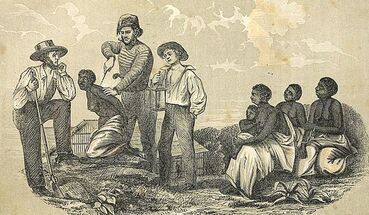 Ye Millemonts of the Age! Draw near, hear, with detestation, the recital of your enormities, and avoid a recommission of crimes which mark, with infamy, the name of MAN! Ye advocates for the iniquitous traffic of your fellow-creatures! rejoice; for while destroying libertines exist ye shall not be deemed the most atrocious of your species; for ye only ruin the worldly felicity of thousands—only lay waste united families and happy countries—only tear children from parents; parents from helpless children; husbands and wives from each other’s fond embraces, and divide the dearest friends for their remaining term of years in this state of existence, after which, in that blest region where “No fiends torment, no Christians thirst for gold,” [a quote from a poem by Alexander Pope] they shall be reunited in never ending joy, whist ye, sinking under accusation, shall be doomed to perpetual slavery in the only place calculated for the punishment of your crimes: but the libertine, who often gives death to both the body and soul of those whom he has ensnared, shall have the additional torment of being continually goaded by the wretches who were, by him, conducted to the horrid scene of their mutual punishment!
Ye Millemonts of the Age! Draw near, hear, with detestation, the recital of your enormities, and avoid a recommission of crimes which mark, with infamy, the name of MAN! Ye advocates for the iniquitous traffic of your fellow-creatures! rejoice; for while destroying libertines exist ye shall not be deemed the most atrocious of your species; for ye only ruin the worldly felicity of thousands—only lay waste united families and happy countries—only tear children from parents; parents from helpless children; husbands and wives from each other’s fond embraces, and divide the dearest friends for their remaining term of years in this state of existence, after which, in that blest region where “No fiends torment, no Christians thirst for gold,” [a quote from a poem by Alexander Pope] they shall be reunited in never ending joy, whist ye, sinking under accusation, shall be doomed to perpetual slavery in the only place calculated for the punishment of your crimes: but the libertine, who often gives death to both the body and soul of those whom he has ensnared, shall have the additional torment of being continually goaded by the wretches who were, by him, conducted to the horrid scene of their mutual punishment!Yet vaunt not too much O ye sordid purchasers of human flesh! That there are in the Creation sinners of a still blacker hue than yourselves; for deadly dark must be the corners of your flinty hearts. Your advocates—what cause is so bad as to be destitute of a pleader?—your advocates advance the necessity of slaves to cultivate the Western Lands; but we deny that such necessity exists; and we deny it logically. Nothing can be necessary that is evil; and that this practise is evil, may be very easily proved; therefore, it cannot be necessary.
If your lordship and Sir Judas are so hardy as to refuse your assent to our assertion that the sale of human creatures is an evil, the first question which we will ask you, is, whether an African be naturally inferior to an European in point of uncultivated intellect? To this we conclude, as we suppose you to be possessed of common sense, that you will answer—No.—Say, then what would be your sensations on seeing a hundred Englishmen dragged from their native shore—(whether without, or with, the authority of their king)—chained, and confined on board a trading vessel, and knowing that they were torne from their distracted friends for the purpose of performing the work of horses and oxen! What would be your sentiments of their purchasers? And what your tortures, were any of your own children to be seized by the ravagers!
Gracious Heaven, that any man who calls himself a Christian, can give his voice in favor of such execrable proceedings—such tolerated barbarity!!! That any nation which professes to believe the Gospel of Christ, can hesitate to abolish a traffic so diametrically opposite to its divine injunctions!!!
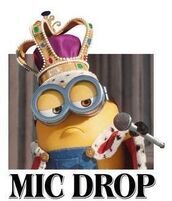 It has been urged that these Africans, till employed by Europeans, are a set of people entirely useless, and that we, kindly, endeavor to render them beneficial to the endeavor to render them beneficial to the universe!
It has been urged that these Africans, till employed by Europeans, are a set of people entirely useless, and that we, kindly, endeavor to render them beneficial to the endeavor to render them beneficial to the universe!Blind! Ignorant! Stupid! Sordid wretches! To suppose that the Almighty Father created thousands of rational beings for no end—no purpose! And that we have been very meritorious in discovering a method to make these supernumerary people of service to the rest of their species, by employing them in business for which, GOD and Nature omitted to qualify them!
If the work of brutes was to be their work, we could teach the Great Omniscient to do much than He has done; we could instruct him to send this part of the human race into this world without the reason with which it is requisite that we should be endured; and by taking care to blunt the edge of their sensibility; by preventing their having any sentiments of affection for their own species, AND by rendering them inaccessible to torture—to prepare them for the condition which is allotted to them.
Will our readers excuse the above digression upon the miseries of thousands of their brethren now slaves in Christian territories? Will they heave the sight of pity and drop the tear of sympathy upon human woes? Or will they, indignantly shut the book and descant upon the absurdity of mixing such a subject with the incidents of a novel?
But again let us remind our censurers that we are not amendable to their judicature. We are sovereigns in our own province, and consider ourselves as superior to every petty critic who shall presume to display his unripened judgment upon our performance. (volume 3 pps 90 to 95) About the author:
The Microcosm is one of several novels by Alethea Lewis (1749--1827), who published anonymously and also under the name Eugenia de Acton. She wrote this scathing editorial against slavery before the slave trade was abolished. Mansfield Park came out after the slave trade was abolished, but some contend today that it was an act of bravery on Austen's part to include references to Moor Park apricots and Severus and Mansfield in her novel, and that she even kept the title "Mansfield" under wraps so as not to create difficulties for herself.
The Microcosm received three reviews, two mostly favourable, one unfavorable. While the critics faulted the work for being discursive, with a too-complicated plot, no-one faulted her stand against slavery. Alethea Lewis also wrote Vicissitudes in Genteel Life. The title is a pretty good description of what it was that sold novels at this time.
Previous post: What was Lord Mansfield famous for?
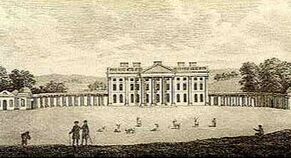 Moor Park, the stately home of Lord Anson “Sir, it is a Moor Park"
Moor Park, the stately home of Lord Anson “Sir, it is a Moor Park"Why apricots as an allusion to slavery, you ask? Because Mrs. Norris and Dr. Grant argue over a Moor Park apricot tree, and the word "Moor" can signify a Moorish person, like Othello. However, in this case it doesn't. I also made an erroneous assumption that "Moor" referred to a windswept heath, but it turns out it's just a variant on the spelling of 'More." Moor Park was the name of an English estate where the apricot was cultivated, which is located on the estate of an older English mansion called the Manor of More.
And why does Mrs. Norris insist that the apricot tree is a Moor Park? Because Moor Park apricots were the most popular variety. “This apricot is considered decidedly the best in cultivation; it is a very great bearer, the fruit is very fine, and deserves to be recommended before any other," says The Fruit-Grower's Instructor, 1825. And a 1998 book about Thomas Jefferson's Monticello estate says that the Moor Park is “the most popular apricot variety of the last two centuries.” (The fruits and fruit trees of Monticello. 1998.)
Insisting that the word "Moor," separate from the name "Moor Park," ought to make us think of Moors, then think of Shakespeare's Othello, then think of black people, then think of slavery, then think of the apricot standing in as a symbol of complicity, is a bit of a stretch, I contend. And an entirely unnecessary one, as we have seen.
Published on September 26, 2023 00:00
September 21, 2023
CMP#153 What was Lord Mansfield famous for?
 This post is part of an ongoing series looking at novels and other books of the long eighteenth century which mention Lord Mansfield, or have characters named Mansfield. The title of Jane Austen's third novel Mansfield Park is thought by many to be an allusion to Lord Mansfield and the Somerset case. an explanation of how I'm exploring this question. If you want a backgrounder on Somerset v Stewart, Dr. Dominique Bouchard gives a fascinating lecture on the
the case here.
CMP#153 What was Lord Mansfield Remembered For? Not Abolition, Evidently Continuing my discussion from my last post we turn from novels to obituaries, books of anecdotes, and one particular historical event he's associated with. Of all the topics that come to mind when people referenced Lord Mansfield, was slavery at the top of the list, or even near the top? It appears this wasn't the case until about the 1840's, but if I find any exceptions, I will add them.
This post is part of an ongoing series looking at novels and other books of the long eighteenth century which mention Lord Mansfield, or have characters named Mansfield. The title of Jane Austen's third novel Mansfield Park is thought by many to be an allusion to Lord Mansfield and the Somerset case. an explanation of how I'm exploring this question. If you want a backgrounder on Somerset v Stewart, Dr. Dominique Bouchard gives a fascinating lecture on the
the case here.
CMP#153 What was Lord Mansfield Remembered For? Not Abolition, Evidently Continuing my discussion from my last post we turn from novels to obituaries, books of anecdotes, and one particular historical event he's associated with. Of all the topics that come to mind when people referenced Lord Mansfield, was slavery at the top of the list, or even near the top? It appears this wasn't the case until about the 1840's, but if I find any exceptions, I will add them.
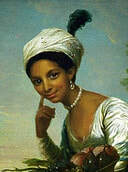 Remembrances When He Died in 1793
Remembrances When He Died in 1793The European Magazine, London Review, the Scots Magazine, and Walker's Hibernian Magazine all printed a brief biography with a collection of anecdotes. It appears to be the same article. No mention of the Somerset case.
The Annual Register, Or a View of the History, Politics, and Literature for the Year 1793 also describes the contents of his will, which mentions the now-famous Dido, as does the Edinburgh Magazine and the Gentleman's Magazine. Dido was referred to as a "free black," not as a family member.
Other newspaper articles did not delve into Mansfield's legal accomplishments, but gave brief biographies, praised his public and private character, discussed his will and the size of his estate, and explained who would inherit his titles. Follow up articles gave details of his final illness and his funeral.
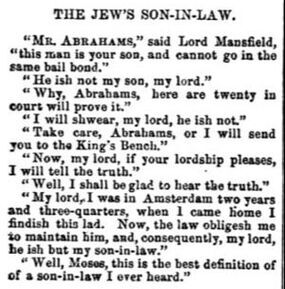 Apocryphal Anecdotes
Apocryphal AnecdotesThe following anecdotes appeared repeatedly throughout the 19th century in various joke books and books of anecdotes. The first one refers to the habit of British juries of deliberately setting the value of stolen goods artificially low, so that the accused person would escape being transported or hanged, since the existing laws of the country were so strict. These might all be simply jokes set in courtroom situations to which Lord Mansfield's name has been attached, and have no resemblance to anything he actually said. Let's assume, for example, that he never addressed a Jewish defendant in the way that he is supposed to have done in the "Jew's Son-in-Law" below right. However, this hilarious bit of banter (eyeroll) was reproduced up to the beginning of the 20th century.
My point is, this is how Lord Mansfield was talked about, thought of, remembered, during the 19th century. The anecdotes go to illustrate his wisdom and humor. I found no anecdotes referencing Somerset v. Stewart. Lord Mansfield being willing to save a man that had stole a watch, desired the jury to value it at ten-pence; upon which, the prosecutor cries out, “Ten-pence, my lord! Why the very fashion of it cost me five pounds.” Oh,” says his lordship, “we must not hang a man for fashion’s sake.”[I am not sure about the first meaning of the word "fashion" in the anecdote, but the point is, the anecdote is not about abolition.]“When this Sagacious Nobleman [Lord Mansfield] was on the circuit, a woman was indicted for witchcraft. The inhabitants of the place were exasperated against her, and among other proofs of her being a witch, they deposed that she had been seen walking in the air with her feet upwards. His lordship heard the evidence with great patience and tranquility... [and ruled]: “Admitting that this woman has walked in the air, as you have said, with her feet upwards, she was born in England as well as yourselves; she, consequently, can only be judged by the laws of the country: now, as I know not of any law that forbids walking in the air with the feet upwards, we all have a right to do so with impunity. I see, therefore, no reason for this prosecution; and the poor woman may return home when she pleases, either walking in the air, or on earth, as she finds most convenient.”
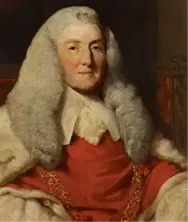 “The late Lord Mansfield, no less eminent for his great acquirements than the acuteness of his understanding, was once asked by a country gentleman, whether he should take upon himself the office of a justice of peace, as he was conscious of his want of legal knowledge? “My good friend,” replied this sagacious lawyer, “you have good sense, honesty, and coolness of temper; these qualities will enable you to judge rightly; but withhold your reasons of decision, for they may be disputable.”A man was brought before Lord Mansfield, when on the home circuit, charged with stealing a silver ladle; and in the course of the evidence, the counsel for the Crown was rather severe upon the prisoner for being an attorney. “Come, come,” said his lordship, in a whisper to the counsel, “don’t exaggerate matters; if the fellow had been an attorney, you may depend on it he would have stolen the bowl as well as the ladle.”
“The late Lord Mansfield, no less eminent for his great acquirements than the acuteness of his understanding, was once asked by a country gentleman, whether he should take upon himself the office of a justice of peace, as he was conscious of his want of legal knowledge? “My good friend,” replied this sagacious lawyer, “you have good sense, honesty, and coolness of temper; these qualities will enable you to judge rightly; but withhold your reasons of decision, for they may be disputable.”A man was brought before Lord Mansfield, when on the home circuit, charged with stealing a silver ladle; and in the course of the evidence, the counsel for the Crown was rather severe upon the prisoner for being an attorney. “Come, come,” said his lordship, in a whisper to the counsel, “don’t exaggerate matters; if the fellow had been an attorney, you may depend on it he would have stolen the bowl as well as the ladle.”
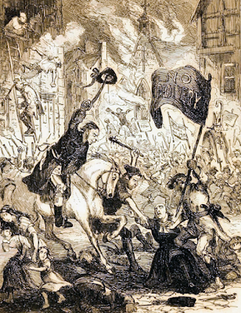 The 1780 Gordon Riots
The 1780 Gordon RiotsLord Mansfield was also referenced in history and in fiction for his connection to the anti-Catholic Gordon Riots. A London mob invaded his home because he was thought to be sympathetic to Roman Catholics. The "In Our Time" BBC podcast discusses the Gordon Riots and here is a post at Regency History. In Maria Edgeworth’s 1817 novel Harrington, set in the time of the riots, Lord Mansfield is mentioned: “Monday morning Mr. Strachan was insulted; Lord Mansfield treated it as a slight irregularity.—Monday evening Lord Mansfield himself was insulted by the mob; they pulled down his house, and burnt his furniture.”Charles DIckens's 1841 novel Barnaby Rudge portrays the Gordon RIots: "the mob gathering round Lord Mansfield’s house, had called on those within to open the door, and receiving no reply (for Lord and Lady Mansfield were at that moment escaping by the backway), forced an entrance according to their usual custom [and destroyed] the rarest collection of manuscripts ever possessed by any one private person in the world, and worse than all, because nothing could replace this loss, the great Law Library, on almost every page of which were notes in the Judge’s own hand, of inestimable value,—being the results of the study and experience of his whole life. That while they were howling and exulting round the fire, a troop of soldiers, with a magistrate among them, came up, and being too late (for the mischief was by that time done), began to disperse the crowd." The Gordon Riots are also dramatized in the tale, The Rival Apprentices(1880). “At about twelve o’clock at night, another desperate gang attacked the house of Lord Mansfield, the Lord Chief Justice, in Bloomsbury-square. Having broken open the doors and windows, they flung the superb furniture into the street, and kindled fires to destroy it. They then went to his library and destroyed thousands of volumes, together with many valuable manuscripts, papers, and deeds. The rich wearing apparel and splendid pictures they wantonly burnt. As for the wine in the cellars, they rank till they were nearly raving mad. Lord and Lady Mansfield had no means of defending themselves against such a mob of dissolute maniacs. They made their escape, therefore, through a back door a few minutes before the rioters broke in, and were admitted by a gentleman to his house in Lincoln’s Inn.”The Vagabond: or, Practical Infidelity (1800) by George Walker is an anti-radical parody, in which the narrator is himself is involved in urging on the mob during the Gordon Riots. “The division under our direction proceeded to Lord Mansfield’s; and there liberty and rational principles received a complete triumph over all regular order. The musty records of precedents, cases and law, made a fire to warm the people they had so long enslaved; I own I wished to have preserved several works of curiosity and art, but Stupeo would not suffer a thing to be taken. –‘Let them all perish together, said he… an you not perceive that the destruction of property must be the grand aim; from those who have little we must take that little, and the hoards of affluence must be utterly destroyed. As long as one single cart-load of property remains in any country there will be no genuine equality.'”
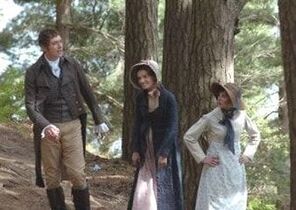 Incidentally, it might be the Gordon Riots that Henry Tilney is alluding to in Northanger Abbey: "You talked of expected horrors in London—and instead of instantly conceiving, as any rational creature would have done, that such words could relate only to a circulating library, [Eleanor] immediately pictured to herself a mob of three thousand men assembling in St. George’s Fields, the Bank attacked, the Tower threatened, the streets of London flowing with blood, a detachment of the Twelfth Light Dragoons (the hopes of the nation) called up from Northampton to quell the insurgents, and the gallant Captain Frederick Tilney, in the moment of charging at the head of his troop, knocked off his horse by a brickbat from an upper window. Forgive her stupidity. The fears of the sister have added to the weakness of the woman; but she is by no means a simpleton in general."
Incidentally, it might be the Gordon Riots that Henry Tilney is alluding to in Northanger Abbey: "You talked of expected horrors in London—and instead of instantly conceiving, as any rational creature would have done, that such words could relate only to a circulating library, [Eleanor] immediately pictured to herself a mob of three thousand men assembling in St. George’s Fields, the Bank attacked, the Tower threatened, the streets of London flowing with blood, a detachment of the Twelfth Light Dragoons (the hopes of the nation) called up from Northampton to quell the insurgents, and the gallant Captain Frederick Tilney, in the moment of charging at the head of his troop, knocked off his horse by a brickbat from an upper window. Forgive her stupidity. The fears of the sister have added to the weakness of the woman; but she is by no means a simpleton in general." In the minds of the middling class, the riots represented a fearful collapse of law and order, and the possibility of violent mob rule. Lord Mansfield's lost library, including his mementos of his friends Pope and Swift, was a terrible blow for him, but he declined to ask for public compensation for it. Finally, we'll look at how history books and biographies summed up Lord Mansfield's life. Was his ruling in Somerset v. Stewart a prominent part of those biographies? Next post. Previous post: Mentions of Mansfield
Published on September 21, 2023 00:00
September 14, 2023
CMP#152: Mentions of Mansfield
 This blog explores social attitudes in Jane Austen's time, discusses her novels, reviews forgotten 18th century novels, and throws
some occasional shade
at the modern academy. The introductory post is here. My "six simple questions for academics" post is here. CMP#152: Novels which mention Lord Mansfield
This blog explores social attitudes in Jane Austen's time, discusses her novels, reviews forgotten 18th century novels, and throws
some occasional shade
at the modern academy. The introductory post is here. My "six simple questions for academics" post is here. CMP#152: Novels which mention Lord Mansfield
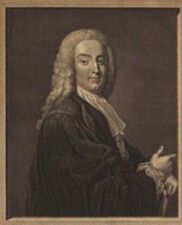 Lord Mansfield (1705 – 1793) I've been exploring whether we can assume that readers of Austen's time automatically thought of Lord Mansfield when they saw the name Mansfield Park, and specifically, would think of his ruling in Somerset v Stewart. (If you want a backgrounder on what I'm talking about,
start here).
Lord Mansfield (1705 – 1793) I've been exploring whether we can assume that readers of Austen's time automatically thought of Lord Mansfield when they saw the name Mansfield Park, and specifically, would think of his ruling in Somerset v Stewart. (If you want a backgrounder on what I'm talking about,
start here).
I agree that in Austen’s time, William Murray, Lord Mansfield, was well known and his memory was held in high regard; not universally, because he was at one time involved in politics and therefore he was a member of a political party, which means he had political opponents. More on that coming up.
Although the readers of the Regency remembered Lord Mansfield, this doesn't mean that he was primarily remembered for the Somerset v. Stewart case. He was a famous legal reformer and a highly respected jurist, so he was remembered for a lot of things. The Somerset case in particular was not, as far as I can see, the top of mind association for a reader in Austen's time, and I'll give examples to show that in this and future posts.
So far, we've looked at novels in which the authors used the name "Mansfield" for their characters--some good, some bad, some central, some peripheral--with no evident association with either Lord Mansfield or slavery.
This post will focus on novels in which the narrators or the characters made passing references to the real Lord Mansfield. Some quote him, some refer to him in general, some refer to his judicial wig, some to his rulings on libel. You'll see that I could not turn up a novel which referenced Mansfield's Somerset ruling.
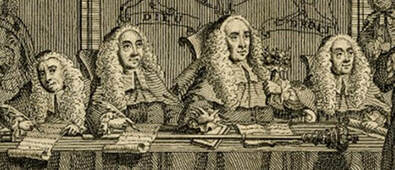 Lord Mansfield hearing the Wilkes case References to Lord Mansfield by the narrators in a novelAn 1813 novel included a long effusion in Volume III about fame. Lord Mansfield is given as an example of someone who deserves deathless fame. “Lord Mansfield is not yet forgotten by those who have understanding to discern, and taste to admire, a great Genius, exercised in unfolding the intricacies of an obscure science, in the most elegant and comprehensive simplicity of language. I hope he will be remembered not only by lawyers, but by every man of principle and talents, when his Doctrine of Libels is forgot." The author, David Paynter, also mentions one of Mansfield’s most famous cases, the Wilkes case, but not Somerset v. Stewart. (The History and Adventures of Godfrey Ranger by David William Paynter. R.&W. Dean, 1813)In “The Fashionable Wife and Unfashionable Husband,” in Amelia Opie’s Simple Tales (1815), a young man is distracted from his law studies by love, “for he was conscious that his thoughts had been employed on another decision, and one of more importance in his eyes than any one even of lord Mansfield’s; he had been examining the pleadings of his own heart, and the decision of his conscience had been—that he was in love.” “Dr. Johnson has said, 'that in a company of generals and admirals every other man falls in his own opinion; and that even the great Lord Mansfield would have crept under the table in such society, if they had talked of the engagements they had been in.'” Country Houses by Charlotte Trimmer, 1832 (More on that Johnson quote below)“Having prepared himself a woman’s war of words, for skirmishing and sharpshooting on the part of Henrietta, he assumed a most heroic posture, and came down to breakfast looking as dignified as Lord Mansfield in his marble wig, among the tombs of Westminster Abbey. The Fair of Mayfair, 1832A description of a room includes this: "Still higher up was an engraving of the great Lord Mansfield, corresponding with a similar plate of Lord Chancellor Thurlow, at the opposite end of the room. Large iron boxes filled with deeds, and inscribed with the names of the owners, reposed in niches on all sides." Our island: comprising forgery, a tale and the lunatic, a tale, by Humphry William Woolrych, 1832Lord Mansfield was famous on both sides of the Atlantic, long after his death in 1793. An 1837 American novel, The Dutchman’s Fireside, contains a passing reference to the wig with a Biblical pun thrown in for good measure: ”inasmuch as that when the head is so full of law that it can hold no more, a vast superfluity of knowledge may be accommodated in the curls of the wig. Hence it has been gravely doubted whether those profound decisions of my Lord Mansfield and Sir William Scott, which constitute the law and the profits in our courts, did actually emanate from the brains or the wigs of the aforesaid oracles.” The Dutchman's Fireside: A Tale, by James Kirke Paulding. United States, Harper & Brothers, 1837.Swallow Barn, Or, A Sojourn in the Old Dominion,1853, has a passing reference: “Old Nick enjoyed that solid popularity which, as lord Mansfield expressed it, follows a man’s actions rather than is sought after by them.” Swallow Barn, Or, A Sojourn in the Old Dominion, by John Pendleton Kennedy.G.P. Putnam,1853. References to Lord Mansfield made by characters in a novelIn the 1800 novel Douglas, or, the Highlander, by Robert Bisset, Mr. Rhodomontade, who is a boaster and a name-dropper, recounts a street brawl he engaged in as youth with his old friend the Earl of Sandwich. “Many a hard bout we two have had… He and I, cleared a dozen of bullies… My good friend Henry Fielding, I remember, he, you know, that wrote Don Quixote, was justice at Bow Street, and read us a severe lecture. Billy Murray, I remember, bailed us, he that is now Lord Mansfield.”“They had the insolence to say Dr. Scribble was a dunce… could flesh and blood bear it? Was it not a libel? -- I believe Lord Mansfield would declare it so," a character complains in Modern literature, by Robert Bisset, 1804
Lord Mansfield hearing the Wilkes case References to Lord Mansfield by the narrators in a novelAn 1813 novel included a long effusion in Volume III about fame. Lord Mansfield is given as an example of someone who deserves deathless fame. “Lord Mansfield is not yet forgotten by those who have understanding to discern, and taste to admire, a great Genius, exercised in unfolding the intricacies of an obscure science, in the most elegant and comprehensive simplicity of language. I hope he will be remembered not only by lawyers, but by every man of principle and talents, when his Doctrine of Libels is forgot." The author, David Paynter, also mentions one of Mansfield’s most famous cases, the Wilkes case, but not Somerset v. Stewart. (The History and Adventures of Godfrey Ranger by David William Paynter. R.&W. Dean, 1813)In “The Fashionable Wife and Unfashionable Husband,” in Amelia Opie’s Simple Tales (1815), a young man is distracted from his law studies by love, “for he was conscious that his thoughts had been employed on another decision, and one of more importance in his eyes than any one even of lord Mansfield’s; he had been examining the pleadings of his own heart, and the decision of his conscience had been—that he was in love.” “Dr. Johnson has said, 'that in a company of generals and admirals every other man falls in his own opinion; and that even the great Lord Mansfield would have crept under the table in such society, if they had talked of the engagements they had been in.'” Country Houses by Charlotte Trimmer, 1832 (More on that Johnson quote below)“Having prepared himself a woman’s war of words, for skirmishing and sharpshooting on the part of Henrietta, he assumed a most heroic posture, and came down to breakfast looking as dignified as Lord Mansfield in his marble wig, among the tombs of Westminster Abbey. The Fair of Mayfair, 1832A description of a room includes this: "Still higher up was an engraving of the great Lord Mansfield, corresponding with a similar plate of Lord Chancellor Thurlow, at the opposite end of the room. Large iron boxes filled with deeds, and inscribed with the names of the owners, reposed in niches on all sides." Our island: comprising forgery, a tale and the lunatic, a tale, by Humphry William Woolrych, 1832Lord Mansfield was famous on both sides of the Atlantic, long after his death in 1793. An 1837 American novel, The Dutchman’s Fireside, contains a passing reference to the wig with a Biblical pun thrown in for good measure: ”inasmuch as that when the head is so full of law that it can hold no more, a vast superfluity of knowledge may be accommodated in the curls of the wig. Hence it has been gravely doubted whether those profound decisions of my Lord Mansfield and Sir William Scott, which constitute the law and the profits in our courts, did actually emanate from the brains or the wigs of the aforesaid oracles.” The Dutchman's Fireside: A Tale, by James Kirke Paulding. United States, Harper & Brothers, 1837.Swallow Barn, Or, A Sojourn in the Old Dominion,1853, has a passing reference: “Old Nick enjoyed that solid popularity which, as lord Mansfield expressed it, follows a man’s actions rather than is sought after by them.” Swallow Barn, Or, A Sojourn in the Old Dominion, by John Pendleton Kennedy.G.P. Putnam,1853. References to Lord Mansfield made by characters in a novelIn the 1800 novel Douglas, or, the Highlander, by Robert Bisset, Mr. Rhodomontade, who is a boaster and a name-dropper, recounts a street brawl he engaged in as youth with his old friend the Earl of Sandwich. “Many a hard bout we two have had… He and I, cleared a dozen of bullies… My good friend Henry Fielding, I remember, he, you know, that wrote Don Quixote, was justice at Bow Street, and read us a severe lecture. Billy Murray, I remember, bailed us, he that is now Lord Mansfield.”“They had the insolence to say Dr. Scribble was a dunce… could flesh and blood bear it? Was it not a libel? -- I believe Lord Mansfield would declare it so," a character complains in Modern literature, by Robert Bisset, 1804In Strategems Defeated (1811), the hero, Lord Devereux, learns of the demise of a miserly relative. His friend writes tell him that he is the sole heir of two hundred and sixty thousand pounds. “Like the late Lord Mansfield, he seems to have preferred lending his money upon mortgages, to placing it in the funds… I only wish I knew eight misers like himself.” This suggests that Lord Mansfield, like a good Scot, had a reputation for being canny with his money. Strategems Defeated is reviewed by me here.One of the correspondents in an 1816 epistolary novel says "I am quite of Lord Mansfield’s opinion. He once observed, that if a single syllable from his pen could confute an anonymous defamer, he would not gratify him with the word.” (Self-deception; in a Series of Letters., by Emma Parker, T. Egerton. 1816)In the novel Florence Macarthy, a young lawyer complains when a judge cuts him off from making a lengthy speech in court. “'My lord, I must observe,' continued young Crawley, petulantly, 'that among the virtues of a judge, patience is the most necessary; and Lord Mansfield, my lord, obtained more credit for that virtue, than for all his other judicial merits combined.' 'Then, Sir, my Lord Mansfield never was obliged to listen to you,' replied the judge, coldly. A universal smile followed this observation." Florence Macarthy: An Irish Tale, by Lady Morgan, W.B. Gilley, 1819.History of George Godfrey (1828) by Thomas Gaspey. In this picaresque adventure tale, which appears to be a precursor to Dickens, this bit of dialogue occurs: “Do you think a jury would give any verdict against a journal which had only stated the honest truth, to warn the public against fraud?” “No doubt of it. The cry is, ‘the greater the truth, the greater the libel,’ as they tell you Lord Mansfield once said; but I do not believe a word of it. However, that goes down now, and, of course, the worse a man’s character really is, the better claim has he to bring damages against those who speak against him.” “Is this the law?” “Certainly—or, at any rate, the practice.” If I come across a novel which references Lord Mansfield's ruling in Somerset v Stewart, I will post it here.
I think the theory that "Mansfield Park" refers to Mansfield, and specifically to Somerset v Stewart would be strengthened if we could find some examples of other writers connecting Mansfield with slavery during this period.
Moving beyond novels, there are also books of anecdotes and even joke books which reference the famous jurist. More on those next.
For a detailed explanation of Somerset v. Stewart, there's this informative video by Professor Dominique Bouchard
Previous post: Very minor Mansfields
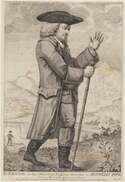 Dr. Samuel Johnson Dr. Johnson's remark about Lord Mansfield creeping under the table comes from Boswell's Life of Johnson. It follows his famous remark "Every man thinks meanly of himself for not having been a soldier or not having been at sea." Boswell answers, "Lord Mansfield does not." Johnson: "Sir , if Lord Mansfield were in a company of general officers and admirals who have been in service, he would shrink; he’d wish to creep under the table.” Boswell and Johnson go on from there with Johnson maintaining that everyone admires martial bravery more than wisdom.
Dr. Samuel Johnson Dr. Johnson's remark about Lord Mansfield creeping under the table comes from Boswell's Life of Johnson. It follows his famous remark "Every man thinks meanly of himself for not having been a soldier or not having been at sea." Boswell answers, "Lord Mansfield does not." Johnson: "Sir , if Lord Mansfield were in a company of general officers and admirals who have been in service, he would shrink; he’d wish to creep under the table.” Boswell and Johnson go on from there with Johnson maintaining that everyone admires martial bravery more than wisdom.Dr. Johnson also said of Lord Mansfield, in response to "a person in company saying, that he had heard Lord Mansfield was not a great English lawyer; 'Sir, you may as well maintain, that a carrier who has driven a packhorse between Edinburgh and Berwick for thirty years, does not know the road, as that Lord Mansfield does not know the laws of England.'"
Published on September 14, 2023 00:00
September 6, 2023
CMP#151 Mansfield as a Bit Player
 “My argument is that “Mansfield” is a name of generic Englishness, that it is so widely found as to make singling out a reference to Lord Mansfield both untenable and only understandably popular because of its capacity to be exploited in readings of Mansfield Park that bestow upon the novel a twentieth-century political correctness.” -- John Wilshire (link to pdf) CMP#151 Mansfield as a Bit Player, not Symbolic Allusion in my previous posts, one of the things that makes the "Mansfield Park-is-named-after-Lord Mansfield" theory questionable is the fact that many other novels used the name Mansfield for their characters without any evident reference to the Chief Justice much less to the issue of abolition. Here are a few more examples.
“My argument is that “Mansfield” is a name of generic Englishness, that it is so widely found as to make singling out a reference to Lord Mansfield both untenable and only understandably popular because of its capacity to be exploited in readings of Mansfield Park that bestow upon the novel a twentieth-century political correctness.” -- John Wilshire (link to pdf) CMP#151 Mansfield as a Bit Player, not Symbolic Allusion in my previous posts, one of the things that makes the "Mansfield Park-is-named-after-Lord Mansfield" theory questionable is the fact that many other novels used the name Mansfield for their characters without any evident reference to the Chief Justice much less to the issue of abolition. Here are a few more examples.
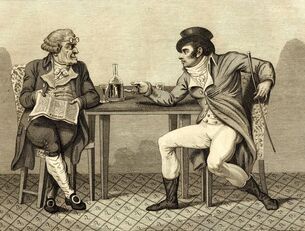 The hero's grouchy old uncle cuts him off, and Frederic has to wander the world, pining for his sweetheart The Heir of Montague (1796-7):
The hero's grouchy old uncle cuts him off, and Frederic has to wander the world, pining for his sweetheart The Heir of Montague (1796-7):The Heir of Montague follows one English family, the Montagues (not to be confused with the real noble family of the same name). We open with the life story of grandfather Montague, who has one son and two daughters.
One daughter elopes but the unsanctioned marriage ends with the early death of the lovers, leaving their son Frederic, who is the main hero. The other daughter becomes a scolding spinster. In addition to being miserable to her family, she argues about politics--the 18th century version of the culture wars. As her saucy niece Cecelia explains, “Why you know my aunt is a democrat; well, she had been descanting upon rights of man, social happiness, necessary violence, and the blessings of the revolution in France, when I interrupted her, and advised a journey thither…”
Cecelia and her cousin are raised by her grouchy father, (the one son mentioned above) who has married a nice ladylike woman. Frederic and Cecelia do not fall in love. Although the countryside is shown as the abode of virtue in novels of this stamp, as opposed to the wicked city, here the countryside is also portrayed as being very dull and tedious for Mrs. Montague, Frederic, and Cecelia. Frederic is educated by an exceedingly long-winded vicar, Dr. Evans, who is opposed to all sorts of things, including singing in public, and warns against the many dangers lurking out there in the world to trap the innocent and unwary.
Thanks to the plot device of a carriage accident, Frederic meets the beautiful and principled Emma Nevil, who comes from a lower social strata than the Montagues. Impediments, hardships, and separations ensue before the pair can be happily united...
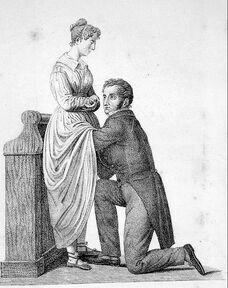 Snoopy doctor Mansfield, a minor meddler
Snoopy doctor Mansfield, a minor meddlerA character referred to simply as “Mansfield” appears briefly in the second volume, luring Frederic and his friend George into a drinking party and then to a brothel. Frederic is exposed to temptation in the form of a painted doxy, but recalls his lovely sweetheart in time and escapes. Mansfield is described as “tall and ill made, dark and sallow complexioned, except where pimples gave a disgusting redness, and his address was, at the same time, rough and affected.” Frederic later learns that Mansfield had laid a bet that he could corrupt the unworldly hero, Mansfield drops out of the novel after he has played his part.
The Heir of Montagu features long passages of dialogue in between the actual events of the story. It might be of interest to scholars studying Jacobin and anti-Jacobin novels because the characters discuss the war in Europe, the French revolution, the merits of specific writers and poets, and the dangers and rewards of novel-reading. In the third volume, an anti-republican mob burns the effigies of Thomas Paine and Dr. Joseph Priestley.
The Critical Review gave The Heir of Montague a lukewarm review: “Although the characters in this novel are copies, and the incidents are of the common kind, it may be considered as usefully tending to expose the errors of youthful indiscretion and vulgar prejudices. Much of this, as of most modern novels, is thrown into the form of dialogue, probably from a supposition that it is easy to write in that way…” The review does not mention the character of Mansfield, or indeed any of the characters, or take issue with what they had to say about politics.
The Ward of Delamere: a tale (1815) by Elizabeth Sibthorpe Pinchard
I have only read enough of this novel to understand that the character Mr. Mansfield is a surgeon. He gets involved in spying on the romance between the heroine Magdalena and her sweetheart. “Mr. Mansfield found, that any intelligence he could gain of her, would be extremely acceptable at the different houses where he visited. He was a young man, not long established in his profession; and one of those busy, prying characters, who love better to investigate the affairs of others, than attend to their own.” He liked to “please, by indulging his patients with whatever gossip he could collect, than by studious research, and scientific attainment, to render himself an ornament of a noble profession, and a desirable companion for minds of superior comprehension.”
The Monthly Review was pretty scathing: "The distresses of the fair Magdalena are such as might have been obviated by a little candour and common sense; and they are not terminated by any effort of her own, but by a most extraordinary coincidence, which brings all her relations, who were supposed to be dead or mad, into the same apartment on her wedding-day."
The author also wrote books for children, which--naturally--were of an improving nature. Her novel Mystery and Confidence (1814) is about a farmer's daughter who marries an Earl (an Earl who is accused of murdering his first wife) so that might be fun to read sometime and it looks to be, like Emma, an early example of a mystery novel: The Critical Review reported: "Though these volumes come before us in an anonymous guise, yet we have found in them something superior to the productions of many fair attendants in the literary vineyard; who bring forth their fruits under sweet-sounding names, followed up with a list of former labours. This tale is naturally told, and it also possesses the advantage of being disencumbered from episodes, under plots, and counterplots, which, of late years, chilling thought! seems to have become necessary to eke out five or six volumes of novel or romance."
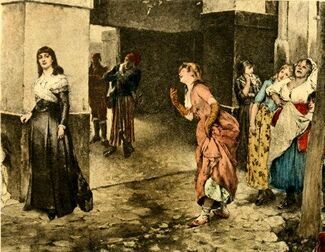 The Prison of Montauban, Or, Times of Terror (1810) by Julia Barnard Smith
The Prison of Montauban, Or, Times of Terror (1810) by Julia Barnard SmithThe title suggests a Gothic thriller, but The Prison of Montauban, though published in 1810, returns to the times of the French Revolution, and combats the pernicious scourges of vice, republicanism and atheism. "Mr. Mansfield" is simply a convenient name for a very minor character, an elderly family friend who helps the heroine, Isabella Montford, sort out her affairs after she is orphaned. This could not be a representation of Lord Mansfield because his family name is Murray, not Mansfield.
Isabella de Montford is the only child of the Baron de Montford. The novel goes over her education, a popular and enduring theme for novels of this time. She grows up with a young man named Dubois, a ward of the baron. She does not fall in love with him, but the baron decides that he'd make an excellent husband anyway. Let's turn to the Critical Review for the rest: "The baron, who is much prejudiced in the young man’s favour, destines him for the all-accomplished and virtuous Isabella, the stay and the solace of his remaining days. Isabella consents to her father’s wishes; and Dubois is admitted as a candidate for her favour. He expresses his gratitude with formal complacency, is extremely easy on his approaching happiness, and takes every thing that comes in his way with perfect coolness. Before the time is fixed for their marriage, the baron and his daughter are seized by municipal officers and dragged to different prisons in France. The horrors of the prison in which Isabella was placed, urged her to importune the goaler [sic] to give her ‘any hole but where she was.’ He takes her by the arms and drags her through dark places and strong doors to a kind of cell, saying, as he enters, ‘I have brought you a nice companion, young citizen, and closed the door upon her. A tall male figure traversed the apartment,’ This tall figure proves to be the Marquis de Villeneuf, who had frequently visited at Mont Cassel, and became enamoured of Isabella, but his addresses are refused in favour of Dubois, her father’s ward. This young nobleman is described as possessing many and great virtues, but of very free notions. He thought it safe to wander without a guide to the edges of precipices and ravines, as to walk in a narrow and secure path. He had given but little thought to the more serious subjects of morality and religion, and therefore it falls to the lot of Isabella to fix his faith in the latter, and strengthen his resolution in the former. This she does with much good sense in the prison of Montauban, where they spend some melancholy time in the expectation of being led to the guillotine.”
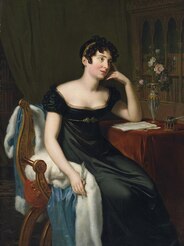 Dangerous sentiments? Sydney, Lady Morgan Virtuous Titillation!
Dangerous sentiments? Sydney, Lady Morgan Virtuous Titillation!“The respect and delicacy which the Marquis shows to Isabella in this trying situation, for they have but one room and a small recess for a bed which he gives up to her…. [and] he refrains from speaking of his passion and suffers not a look nor a word to embarrass her. The door of her prison is at length opened by her destined husband [who] does not at all relish the idea of Isabella’s being domesticated with the Marquis in the prison, though she assures him of his upright conduct and undeviating delicacy.” Because of his suspicions, DuBois can’t bring himself to marry Isabella, so she is free to receive declarations of love from the Marquis “which, after a proper time, are accepted.”
One aspect of interest with this novel is that the authoress uses her foreword to call out and condemn the indecency of the writings of Sydney, Lady Morgan, author of the best-seller The Wild Irish Girl (1806). “I have only, by accident, cast my eyes upon one of this young Hibernian’s productions, and am resolved no other shall pollute my mind.”
The Prison of Montauban is not described as a "novel," but as a "reflective tale." Smith insisted “it is not a novel, since it contains neither of swoonings, idolatry, or seduction; nor of expressions, and situations bordering upon blasphemy and indecency.”
The Feminist Companion to Literature in English describes Smith as a "conservative" but has no biographical details or dates for her.
Thanks to the invaluable British Fiction 1800-1829 website for the reviews I've quoted. As we have seen, there are plenty of examples of novels with characters named Mansfield. Now, what about novels with mentions of the real Lord Mansfield? We'll turn to those next.
Two Suitors Named Mansfield
Published on September 06, 2023 00:00
August 31, 2023
CMP#150 Two Suitors Named "Mansfield"
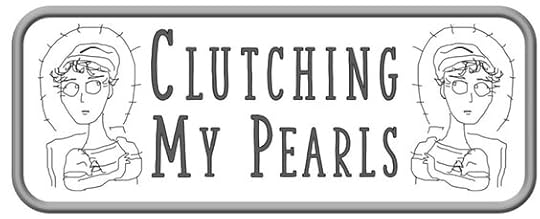 Clutching My Pearls is about Jane Austen, her art, her critics, and the times she lived in.
Clutching My Pearls is about Jane Austen, her art, her critics, and the times she lived in. Click here for the first in the series. CMP#150 Two Tales with Suitors Named "Mansfield" with some introductory opining
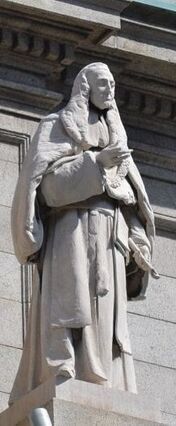 Lasting legacy Recently, I’ve been seeking out novels from Austen’s era with characters named "Mansfield."
I've published
a few posts about them, but I had better explain more fully what I'm up to and my reasons for doing it.
Lasting legacy Recently, I’ve been seeking out novels from Austen’s era with characters named "Mansfield."
I've published
a few posts about them, but I had better explain more fully what I'm up to and my reasons for doing it.I am exploring the assumption--well, more than an assumption, it's become an article of faith--that the name "Mansfield" in Mansfield Park is a subtle allusion to Lord Mansfield. That is, our modern scholars take it for granted that a book published 21 years after Lord Mansfield's death would inevitably make readers of that era think of the eminent British jurist. The follow-on assumption is that the top-of-mind association for that reader at that time, was Mansfield's ruling in the Somerset v. Stewart case which effectually ended the practise of slavery on British soil.
I think both of these assumptions can be tested, or at least prodded at a little bit.
As to why I am interested in this question: yes, it's true that I don't think Mansfield Park is about slavery, even though it's about a family with colonial property, therefore I doubt that an allusion to Lord Mansfield is intended. But I'm also perplexed about the way that scholars of literature can make these assertions without even attempting to test them--and they can be tested. We can look for evidence to support or detract from the assertion and we can weigh possibilities. I'm perplexed when scholars share assertions about Austen's meaning that have no more substance behind them than if they had communed with her shade using a Ouija board. They make little to no attempt to test the plausibility and historicity of their assertions, which of course leaves them open to the suspicion that they simply believe what they want to believe. As an example, some confidently believe that Austen viewed marriage in the same light as slavery, and subtly conveyed this message in her novels. They want to believe Austen was a radical girl boss, not a woman who held the conventional moral and political views of her time.
Questioning our assumptions starts with placing Austen's work in its time, not our time.... The Reference to Mansfield Placed in Context
In this example, if Mansfield Park is indeed an intentional allusion to Lord Mansfield, how can we look for corroboration that the connection was obvious to a discerning reader of the era--rather than just assuming that it was?
Does the name "Mansfield Park" mean that a reader of the times who saw just the name, seeing just the spine of the book with the title printed on it, or seeing it advertised in the paper, would say to themselves: "This must be about slavery," or "This must be about Lord Mansfield." Or would the connection only become evident to them after opening the book and getting to the part about the property in Antigua?
Did anybody mention the connection before 1983 ? I'm not aware that any Austen critics and scholars did, let alone any of her legions of devoted readers. That doesn't disprove the connection, but it sure doesn't help. You'd have to believe that this was an allusion hundreds or even thousands of people noticed and nodded their heads over, but nobody mentioned it in a letter, a diary, or an article. "How clever of Miss Austen to invoke Lord Mansfield's name in her title" said nobody prior to 1983.
Can we find other writers who use Mansfield's name, just his name, to subtly signal their disapproval of slavery? Finding such a writer would certainly buttress the argument, although the lack of one doesn't negate the possibility that Austen is the lone genius who did use his name. I haven't found any other examples, but I'll keep looking.
Can we find authors who invoke Mansfield for reasons apart from the Somerset case? Yes, and I'll get back to those examples in future.
On the other hand, can we find authors who use the name "Mansfield" without any obvious reference to slavery in the story, thereby showing that it was possible to use the name "Mansfield" without being understood to be referring to the famous jurist? I have already given examples of stories with characters named Mansfield in previous posts. Here are two more.
In both these stories, the name “Mansfield” is given to a young male suitor. These stories have nothing to do with slavery. No-one in the story is a slave trader or owner and there are no references to colonial fortunes. Read these summaries and judge for yourself.
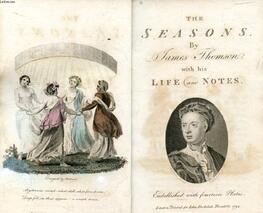 The Shepherdess (1789)
The Shepherdess (1789)
“The Shepherdess” is a short story published in The Lady’s Magazine in April, 1789, which was supposedly written by “Wm. Sh__w, a youth of eleven years and a half.” The main characters are Laura Wilmot, a lovely and virtuous shepherdess whose family are tenants on land owned by Mr. Mansfield, the “only son of a gentleman of family and fortune.” Mr. Mansfield’s father dies in the opening passages of the story, and young Mansfield comes back from the Grand Tour to set the family fortune and estates in order. He also enjoys roaming around with his hunting dogs, which leads to his meeting with Laura, as she watches over her flock while shedding a tear over an affecting passage in Thompson’s Seasons. (Although Laura is a shepherdess, she’s had some education and is able to borrow books from the local curate.)
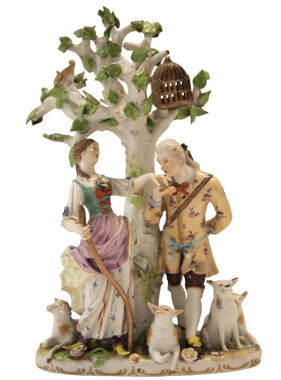 Honorable intentions: Cavalier and Shepherdess Insulting her honour
Honorable intentions: Cavalier and Shepherdess Insulting her honourCharmed by Laura's beauty and sensibility, Mansfield starts talking with her. “Her discourse was always pretty and sensible, never deep or pedantic. Wit she had no pretensions to, always thinking it too sharp to play with.” Mansfield returns for another visit with picnic food, his flute and several more books to read, including Dr. Gregory’s Legacy to His Daughters (a conduct book). “They read to each other, alternately, for several hours.” Soon, Mr. Mansfield falls in love with her and she is in love with him (although of course she hides her feelings, as a modest maiden should).
Mansfield realizes he wants to marry her despite her humble rank, but he takes the ill-begotten notion to test her virtue first by asking her to be his mistress, not his wife. As they are walking back to the village together, he pops the question. Laura does not hesitate to reject his insulting offer.
“Sir,” says Laura, (assuming a stern tone of voice, and a look particularly pointed), “if I am poor, I heartily return thanks to God I am virtuous; I am innocent, and so I will remain. You undoubtedly possess many abilities; sorry am I to declare to you, you put them to the worst of uses, when you artfully endeavour to seduce and inveigle a poor girl from the paths of chastity and honour.” She leaves him with “a look of the most ineffable contempt.”
Realizing too late how crass he's been, Mansfield goes to the curate’s house and asks him to summon Laura and her parents, so that he can make an honourable proposal for her hand. Laura at first is too angry with him to accept, despite being strongly pressured by her parents to say ‘yes.’ The shock and the stress of it all make her ill. After some delay, and “thro’ the aid of the Curate, a reconciliation was happily effected, to the mutual satisfaction of all parties.”
There are no references to slavery, plantations, or colonialism in this short story, though of course it would not be fair to expect symbolism from an eleven-and-a-half year old author. I think we can surmise the author chose the name, and the editors approved and published the story, without anyone supposing that a reference to Lord Mansfield was intended.
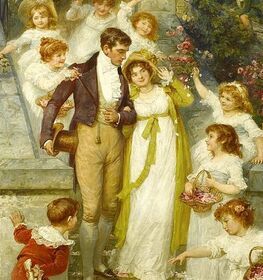 Frederick Morgan - Off for the Honeymoon (detail)
The Parson’s Wife, by a lady, 1789
Frederick Morgan - Off for the Honeymoon (detail)
The Parson’s Wife, by a lady, 1789
In this two-volume novella, Charles Mansfield is the handsome and charming heir to a Welsh baronetcy. (The "parson" of the title is a different character, the suitor and then husband of the main heroine). Young Mansfield courts Constance, the heroine’s best friend, but begins to neglect her. She decides to break off the relationship, whereupon he repents and she takes him back, but we are given some foreshadowing that their marriage will run into trouble: The ”amiable bride” Constance was “much depressed” on her wedding day, but she “endeavoured to exert herself.” The bridegroom “Mansfield seemed to have all her vivacity added to his own.”
After their marriage, Mansfield returns to his habit of neglecting Constance in favor of socializing with his friends. He disappears for days at a time, and he's also living beyond their means. Constance doesn't complain to anyone and keeps her husband's faults a secret. The conflict is resolved after she gently admonishes him and he reforms his ways.
The problems faced by the heroine, Mary Godfrey, and the other characters are likewise resolved in this typically easy fashion. One of Mary's problems is that her suitor, although very eligible, tends to be rather proud and arrogant. Luckily this impediment disappears when he falls in love with her. After they become engaged, a jealous rival attempts to smear Mr. Hadleigh's good name but the effort goes nowhere. The happy couple celebrate their wedding day. “When Mr. Godfrey resigned his daughter at the altar, he sent forth an inward ejaculation, that her husband might prize her as he did. It was a trying moment, to yield his first earthly blessing, as another’s claim.”
The happy pair go to live in his country parish: “the new married pair were not totally secluded from diversions, though they had ever those resources in themselves, which give charms to retirement and make each hour fleeting.” They are joined in the countryside by Constance and her husband, because the countryside, after all, is the only place where people can be truly virtuous.
The topic of slavery does not feature in this novel. The word "slave" is used in the typical fashion to denote a man who is the captive of a woman's charms . Mary's father Mr. Godfrey receives an unexpected inheritance at the beginning of the novel, but the author does not mention if the source of the wealth is colonial. (BTW, did you spot the line that is similar to one in Emma?)
The Parson's Wife had the distinction of being reviewed by Mary Wollstonecraft when she was writing for the Analytical Review. “Such a number of insipid trifling incidents, such mere nothings, are here strung together, that in the language of the vulgar, we wonder what the author would be at; however, the whole had a harmless lulling effect on us…" Wollstonecraft, needless to say, did not remark on the use of the name "Mansfield" because there was nothing remarkable about the name. Charles Mansfield''s father is an unsophisticated Welsh baronet, a sort of Welsh Squire Allworthy type. Charles's aunt is a superstitious spinster. There is no resemblance to Lord Mansfield's life. Actually, if a resemblance had been intended, the character's name would have been rendered as Lord M----d. Lord Mansfield was born William Murray, the younger son of a Scottish nobleman. He was created Baron Mansfield in 1756 and Earl of Mansfield in 1776. He died in 1793, so he was alive and ennobled (that is, he had assumed the name Mansfield) when these two novellas were published in 1789. I see no evidence in the text that young Master William S__w or the authoress of The Parson's Wife intended for their readers to make a connection between the then-living Lord Mansfield and their young male characters named Mansfield, and by extension, to make any connection with slavery.
See here for the beginning of this series and here for another book with a wise older woman named Mansfield.
Previous post: Modern manners and Mansfield
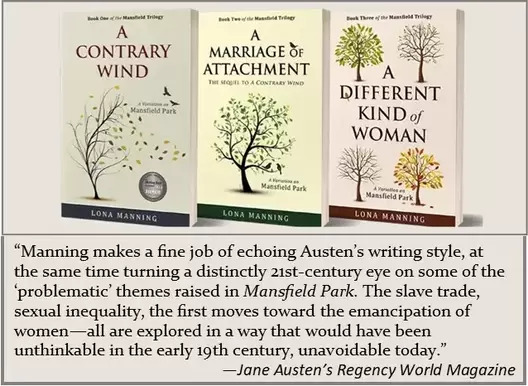
Published on August 31, 2023 00:00



